GROWTH SPURT






























More
firms are opening up
in the
why PAGE 22 January 2023 | $8.50 | nclawyersweekly.com VOLUME 35 NUMBER 1 IN DIGITAL. IN PRINT. IN PERSON. Expertly Focused On Today’s Legal Professional. WEEKLY
law
shop
Carolinas — here’s
CAROLINA PARALEGAL NEWS Paralegal Terri Coker refl ects on winning a mentorship award from national legal staffi ng organization PAGE 21 5 QUESTIONS WITH Smith Anderson attorney Taylor Dewberry on diversity, equity and inclusion PAGE 27




Your defense is our focus. Lawyers Professional Liability In your world – details matter. At First Indemnity we understand that lawyers need a reliable partner in the insurance industry to provide the best possible defense against claims. Our Lawyers Professional Liability Program is a proven leader in national specialty insurance. • Lawyer ’s Malpractice • Cyber Liability • Umbrella Coverage • Surety Bonds • Copyright, Patent & Trademarks See Video “Our business is to underwrite and bind PL policies for lawyers in ” carriers prime with partnership – Andrew Biggio, CEO First Indemnity email: fax: 781. 595.2279 2508 581. 781. Indemnity.net www.First Boston • New York • Tampa • Chicago • Dallas • Los Angeles • Philadelphia
IN PRINT. IN DIGITAL. IN PERSON. Expertly Focused On Today’s Legal Professional.
130 North McDowell Street, Unit B, Charlotte, NC 28204 (704) 377-6221 • FAX(704) 377-4258 E-mail: service@bridgetowermedia.com • Circulation: 1-877-615-9536
Executive Vice President of Media and Senior Group Publisher Liz Irwin, lirwin@bridgetowermedia.com
n EDITORIAL
Interim Editor
Jason Thomas jthomas@scbiznews.com
Reporter Haviland Stewart hstewart@nclawyersweekly.com
Digital Media Manager Scott Baughman sbaughman@mecktimes.com
n ADVERTISING
Advertising Account Executive
Sheila Batie-Jones sbatie-jones@nclawyersweekly.com
n ACCOUNTING & ADMINISTRATIVE
Business Manager
Michael McArthur mmcarthur@bridgetowermedia.com
CONTENTS
COVER STORY: CAROLINA CONFLUENCE p5 | The addition of ‘big law’ and national firms opening in the Carolina has fueled growth in the legal industry
LETTER FROM THE EDITOR p3 | Introducing the new-look North Carolina Lawyers Weekly
n CIRCULATION
Audience Development Manager
Disa Ehrler dehrler@bridgetowermedia.com Circulation 1-877-615-9536 service@bridgetowermedia.com
n ART & PRODUCTION
Creative Director
Melanie Bingham
Project Management
Jordan Mazuranic Production Specialist John Reno
Director of Production Services
Bradley Redmond
WWW. NCLAWYERSWEEKLY.COM
NCLAWYERSWEEKLY
North Carolina Lawyers Weekly [ISSN10411747] [USPS 002-904] is published Monthly with General Statewide Circulation for $410.36 per year by North Carolina Lawyers Weekly, 130 North McDowell Street, Unit B, Charlotte, NC 28204
Periodicals postage paid at Charlotte, North Carolina 28228-9998.
POSTMASTER - Electronic Service Requested. Send address changes
to: North Carolina Lawyers Weekly, Subscription Services, P.O. Box 1051, Williamsport, PA, 17703-9940
To place orders, temporarily stop service, change your address or inquire about billing: Phone: (877) 615-9536 Email: service@bridgetowermedia.com
To submit subscription payments, mail: Subscription Services P.O. Box 1051 Williamsport PA 17703-9940
©2023 BridgeTower Media. Material published in North Carolina Lawyers Weekly is compiled at substantial expense and is for the sole and exclusive use of purchasers and subscribers. The material may not be republished, resold, recorded, or used in any manner, in whole or in part, without the publisher’s explicit consent. Any infringement will be subject to legal redress.
BridgeTower OpCo, LLC d/b/a North Carolina Lawyers Weekly Media is an equal opportunity employer.
DOG DAY IN COURT p8 | Service dogs play a vital role in reducing anxiety
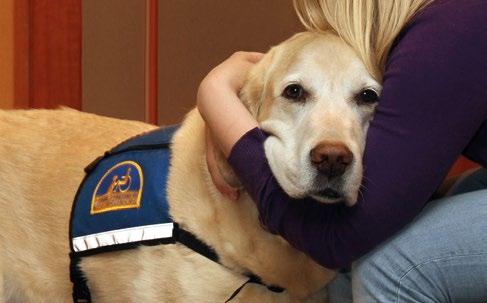
GIFT OF TIME p12 | Attorney David Peet is at his wife’s side in ALS battle
BLOWING THE WHISTLE p16 | Inside the high-profile field of representing whistleblowers
COURTS p19 | ‘Materially adverse’ standard applies to federal employees
CAROLINA PARALEGAL NEWS p21 | ‘A Total Wow Moment’ p22 | Overheard At The Water Cooler’ p24 | Q&A: Mckela Simon p25 | Q&A: Cassandra Furtick
5 QUESTIONS WITH p27 | Taylor Dewberry on diversity, equity and inclusion
LAWYERS IN THE NEWS p46 | A roundup of personnel news at North Carolina firms
VERDICTS & SETTLEMENTS p31 | The latest results on North Carolina legal action
DISCIPLINES p33 | Attorney permanently disbarred
COMMENTARY p33 | Judicial elections have consequences, too
NORTH CAROLINA LAWYERS WEEKLY | JANUARY 2023 3
Welcome
new-look North Carolina Lawyers























You might have heard (or read) about the relaunch of your trusted source for legal industry news. I’m proud to unveil it here, in the following pages.














The reimagined magazine-style format allows for crisper design and more space to dig deeper into issues and trends that affect legal professionals across North Carolina. You’ll notice an example of this in reporter Haviland Stewart’s cover story about the increase in law firms in the Carolinas.
Legal life is more about litigation and poring over rulings in preparation for a case. Lawyers have lives. That is evident from Teri Saylor’s feature on attorney David Peet, who is at his wife’s side as they seek to raise $1 million to benefit ALS research — an affliction that has deeply touched both of them.
We also like to explore unique stories making a difference in the legal industry. Such an example is Stewart’s feature on Courthouse Dogs, which provides professionally trained canines in prosecutor’s offices, child advocacy centers and family courts.
Each issue will also feature a Q&A with a notable attorney. In this issue, it’s Taylor Dewberry, Smith Anderson’s first chief diversity officer, who talks about equity and inclusion in the workplace.
Rest assured, you’ll also find verdicts and settlements here, just like in prior versions of NCLW.

























This evolution isn’t limited to our print edition. We’ve increased the urgency of our digital offerings, with enhanced e-newsletter features and prioritized coverage. Opinions also will take a new life online.
All of these changes are with you, our readers, in mind.

We’re always interested to hear what you think. Feel free to drop me a line about the changes: what you like, what you don’t, how we can be better.

Welcome to a new era of legal industry journalism.
Jason Thomas is the interim editor of North Carolina Lawyers Weekly. Reach him via email at jthomas@scbiznews.com.










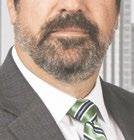

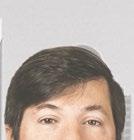













4 JANUARY 2023 | NORTH CAROLINA LAWYERS WEEKLY
NEWS LETTER FROM THE EDITOR
Weekly Cranfill Sumner LLP Welcomes New Additions New Year, New Faces
to the
Charlie Raphun
www.cshlaw.com RaleighCharlotteWilmington
Raleigh - Business Law Of Counsel
Ryan Shuirman
Raleigh - Medical Malpractice Partner
CAROLINA CONFLUENCE
B y H aviland S tewart hstewart @ nclawyersweekly com
Behind the rise of law firms — big and small — opening up shop across the Carolinas

Alan Woodlief, interim dean, and professor of law at Elon University School of Law, has seen the growth of the legal industry in the Carolinas firsthand.
The reason behind the growth? The addition of “big law,” and national firms setting up firms in the Carolinas, he says.
Numbers from bar associations in both states seem to support his view.

According to the South Carolina and North Carolina Bar Associations, bar membership has been increasing over the past six years. In 2016 the South Carolina Bar reported having 439 new admittees, and the North Carolina Bar reported having 548 new admittees. This is contrasted by the substantial growth reported in 2021

when the South Carolina Bar recorded 550 new admittees, and the North Carolina Bar recorded 911 new admittees.
“I’ve noticed just by hearing names popping up more and more that we’ve had a good number of national law firms come into the state, in particular Charlotte and Raleigh,” Woodlief said.
Some of the most influential additions to the “big law” scene in the Carolinas include Womble Bond Dickenson, and Offit Kurman. In 2017, Womble Bond Dickenson was found-
ed in Winston-Salem, following a merger between UK-based Bond Dickinson and U.S.-based Womble Carlyle Sandridge & Rice. The firm now has 23 locations in the U.S. alone, with 35% of their U.S. locations in the Carolinas. Offit Kurman, a national law firm opened a Charlotte office in 2019, since then the firm has also opened offices in Greensboro, Rock Hill, and Spartanburg.




While there are many national firms from across the country expanding into the Carolinas, there are some that have been operating here for over a century.
Large Carolina firm, Parker Poe was founded in Charlotte in 1884, they now have six offices in the Carolinas.
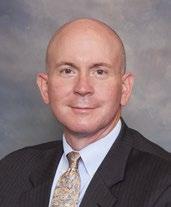

NORTH CAROLINA LAWYERS WEEKLY | JANUARY 2023 5
COVERNEWSSTORY
See Page 6
Alan Woodlief
The national law firm, McGuire Woods, was founded in Charlotte in 1922. They now have 21 locations globally, two of which are in North Carolina. Currently one of the largest law firms in the Carolinas, Moore & Van Allen was founded in Charlotte in 1945. Moore & Van Allen now consists of nearly 400 attorneys with offices in North and South Carolina. One of South Carolinas largest firms, Nexsen Pruet was founded in 1945 in Columbia. Nexsen Pruet now has nine offices, nationally, eight of which are in the Carolinas.
Whether moving to or expanding within the Carolinas, the number of attorneys at Carolina firms is increasing.
In the past few months alone, North Carolina and South Carolina Lawyers Weekly have reported the addition of staff to many firms in the Carolinas including Young Moore, Womble Bond Dickenson, Riddle and Brantley, Gordon and Rees, Fisher Phillips, Ellis and Winters, and Morgan and Morgan.
Partner from growing firm, Womble Bond and Dickenson, Clark Goodman, believes that Charlotte’s growth has made it imperative for firms with a strong presence in the Carolinas to have an office in Charlotte.

While the law industry in Charlotte is growing rapidly, this trend is not unique to law, but rather coincides with the recent increase in big businesses, infrastructure, and population in the city. In fact, according to a recent study conducted by the University of North Carolina’s Kenan-Flagler Business School, Charlotte has been named the 8th fastest-growing city in
the nation.
“The recent acceleration in Charlotte’s growth has increasingly attracted national and international law firms without an existing presence in the region,” Goodman said. “A Charlotte office allows these firms to serve Charlotte’s substantial financial services sector and its growing population of Fortune 1000 companies in high-growth sectors such as manufacturing and technology. Charlotte’s combination of urban amenities and lifestyle advantages over larger, more expensive markets also makes the city an attractive base from which to serve national clients.”
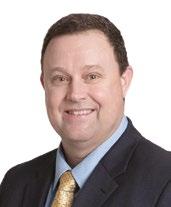
According to data from multiple North Carolina and South Carolinabased law schools, this recent growth in the law field can be seen throughout university statistics. Larry Cunningham, provost, dean, and professor of law at Charleston School of Law, has seen this expansion translated into an uptick in applications and interest in Charleston School of Law. This trend is mirrored by application statistics at Elon University School of Law as well.
“We reached that low watermark in 2014 with 599 applications,” Woodlief said. “Now we’re regularly over 900 applications and have been over 1000 applications.”
After attending law school in the Carolinas, it is common for many students – even those who came from different states – to stay in the Carolinas to begin their professional careers. According to April Giancola, assistant dean of Career and Professional Development at Campbell Law School, over the past four years, they have seen about 77% of students stay in North Carolina after graduating from Campbell.
Aside from many recent law graduates choosing to stay in the Carolinas, Bar Association statistics show that they are successfully landing jobs as well. According to Rob Birrenkott, assistant dean of Career Development at Carolina Law, the
American Bar Association reported that three out of the top 10 law schools with the highest legal employment percentage 10 months post-graduation in the nation were located in North Carolina.
While there has been steady growth in the law field in the Carolinas since 2016, the year with the largest increase of bar association memberships was between 2020 to 2021. Much of this change can be linked to the effect that the COVID-19 virus had on professional life, resulting in many professionals working from home.
“The fact that so many legal employers would now be comfortable with remote work is something that you really wouldn’t have anticipated before the pandemic,” Birrenkott said. “Afterwards, it’s certainly something that has shifted and changed. A lot of legal players are still comfortable with employees working in a remote capacity. When the pandemic originally hit, we thought there was going to be a reduction in hiring. We were really prepared for the worst regarding what’s going to happen to all our grads, but what’s resulted has been a demand for legal services and the demand for legal hiring.”
After the onset of COVID-19 in 2020, many people began working remotely, giving many professionals the opportunity to move to places different from where their jobs were located, undoubtedly contributing to the growing populations in North Carolina and South Carolina.
Between the 2020 and 2021 census, the North Carolina population increased by 112,000 people – 1.1%. In the same time period, South Carolina
6 JANUARY 2023 | NORTH CAROLINA LAWYERS WEEKLY
Clark Goodman
Continued From Page 5 See Page 7 COVERNEWSSTORY
Rob Birrenkott
recorded a total population growth of 72,280 – a 1.4% increase from 2020. With this growing population comes new and growing businesses as well as the need for more attorneys.
“Earlier this year, Business Facilities Magazine and CNBC ranked North Carolina as the top state in the country for business,” Goodman said. “The Carolinas’ inherent business advantages and commitment to investment
in economic development will fuel continued growth. With the arrival of new businesses and the workforce that supports them, the demand for local legal services will also continue to grow.”
Another contributing factor to the increased law activity in the Carolinas can be linked to the implementation of the Uniform Bar Exam in 2017. The Uniform Bar Exam consists of 36 states including North Carolina and South Carolina, allowing attorneys to
take the score they earned in one state and transfer it to any of the states involved. As a result, the law world has experienced significantly more mobility among lawyers that did not exist prior to this change.
“I just think North Carolina is a really fantastic legal market because you’ve got such a diverse and strong economy,” Birrenkott said. “You’ve got a combination of a really strong talent pool with great law schools as well.”
Commission on Professionalism names new leader
James “Jimbo” S. Perry has been named as co-executive director of the Chief Justice’s Commission on Professionalism.
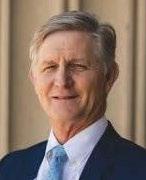
His tenure began Jan. 1, according to a news release from the commission. Melvin Wright is the executive director and has served in this capacity since November 1999 until his retirement in August 2017. Wright resumed his role as executive director in March 2019.
“I have observed Jimbo Perry for over forty years and find that he is the epitome of professionalism,” said Chief Justice Paul Newby said in the release. “He has a reputation for not only being knowledgeable but also courteous and kind to everyone in the courthouse. Certainly, he is a great role model for every lawyer.”
Perry is an attorney with Perry, Perry, & Perry in Kinston. Perry studied at the University of North Carolina School of Law where he graduated in 1980. Immediately after graduation, he worked in private practice then transitioned into the role of assistant United States attorney in the United States Attorney’s Office in Raleigh until 1985. From there, Perry moved back to his
S. Perry
hometown of Kinston to work with his father, mother, sister, and uncle in private practice after founding the firm Perry, Perry, & Perry where he continues to work today.
“We are delighted to add Mr. Perry’s knowledge and expertise to our staff,” said Wright in the release. “We look forward to his contributions to our efforts.”
Perry has served as a member of the Chief Justice’s Commission on Professionalism and is the recipient of the Citizen Lawyer Award, John B. McMillan Distinguished Service Award, Tommy Jarrett Service Award, QC Honors Recognition, Southern Star Recognition, and the 2021 Chief Justice’s Professionalism Award.
“I am honored to be selected for this important role,” said Perry. “I hope to make a real and positive contribution to the pursuit of professionalism in our legal community.”
The Chief Justice’s Commission on
Professionalism was established on Sept. 22, 1998, by order of the Supreme Court of North Carolina. The order established the Commission’s membership and major responsibilities.
The North Carolina CJCP consists of a chairperson, who is the Chief Justice of the Supreme Court or his/ her designee; two judges serving on trial benches of the courts of the state or the United States; and one appellate court judge either from the state or United States. Other members include two law school faculty members from accredited North Carolina law schools, eight practicing lawyers, and three non-lawyer citizens who are active in public affairs. All members, with the exception of the chairperson, serve for a term of three years.
The major responsibilities of the commission include its primary charge: to enhance professionalism among North Carolina’s lawyers. In carrying out this charge, the CJCP is required to provide ongoing attention and assistance to ensure the practice of law remains a high calling, dedicated to the service of clients and the public good.
Staff report
NORTH CAROLINA LAWYERS WEEKLY | JANUARY 2023 7
Continued From Page 6 COVERNEWSSTORY NEWSNEWS
James
COURTHOUSE CANINES
Courthouse facility dogs play a vital role in reducing anxiety, providing comfort for traumatized witnesses

In 2016, in Anderson County, S.C., an eyewitness to murder and attempted murder was preparing to take the stand for The State of South Carolina vs. Robert Frost
According to attorney Chelsey Hucker, the witness was incredibly anxious and unsure if she would be able to testify.
Enter Roma, a courthouse facility dog that gave the witness the capacity to testify by joining her on the witness stand.
“I got to see this witness go from ‘I
cannot, I cannot do it,’ to testifying with Roma under the witness stand, and really making that case,” Hucker said. “We ultimately ended up with a conviction, and that alone is a huge impact.”
Often, witnesses and victims are forced to relive trauma when they describe a traumatic event during a trial. This can cause witnesses to experience physiologic responses which can impact their ability to speak. If the witness cannot testify, the jury is deprived of information that could be critical to the evalua-
tion of the defendant’s guilt or innocence.
This is where courthouse facility dogs enter the picture. They are professionally trained canines working across the globe in prosecutor’s offices, child advocacy centers and family courts. They primarily provide a calming presence and emotional support for children and vulnerable individuals during traumatic legal proceedings. As legally neutral companions for witnesses during the investigation
8 JANUARY 2023 | NORTH CAROLINA LAWYERS WEEKLY
B y H aviland S tewart • hstewart @ nclawyersweekly com
FEATURE See Page 9
Jeeter gets a hug while in court. Photo/Chelsey Hucker
Roma gets some love in the courtroom. Photo/Chelsey Hucker
Continued From Page 8 FEATURE
and prosecution of crimes, these dogs help witnesses feel willing and able to testify.
O’Neill Stephens founded Courthouse Dogs in 2003 after seeing firsthand the importance of incorporating dogs into investigations and prosecutions to provide emotional support – especially to children and vulnerable individuals.
Over the years, the program has made great strides across the globe. As of August 2022, there were 295 dogs working the U.S. as well as additional dogs in Canada, Australia, Argentina, Japan, New Zealand, and parts of Europe.
Eight of these dogs are located in the Carolinas. With five facility dogs stationed in North Carolina and three in South Carolina, Courthouse Dogs has permanently altered the court system through advocating for the importance of emotional support during the judicial process.
“At the beginning of an investigation, especially in a forensic interview, kids have to leave their parent and
have a perfect stranger ask them questions about [a traumatic event],” Ellen O’Neill-Stephens, founder of Courthouse Dogs, said. “A lot of these kids clam up, and when they clam up the police don’t have the evidence they need. There’s no way to move forward with the case easily if the child isn’t cooperating.”
Roma, the 9-year-old Labrador golden retriever mix has worked as a facility dog for the South Carolina court system since she was 2 years old. Roma’s handler, Hucker is a South Carolina attorney and the executive director of a child advocacy and sexual trauma center.

Hucker became involved in Courthouse Dogs in 2014 when she was working for the Anderson County Solicitor’s Office after her boss became interested in introducing this program to their district. As an avid dog lover, but not owner at the time, Hucker met the criteria to train to be a handler.
In 2016, Roma became the first facility dog in South Carolina.
What started as one facility dog at a prosecutor’s office in Seattle has
become an international corporation with the goal of providing emotional support and reducing trauma for witnesses and victims throughout the judicial process.
O’Neill-Stephens, founder and policy director of Courthouse Dogs served as a prosecuting attorney in Seattle for 26 years, until retiring in 2011. She began her experience with assistance dogs when her son, Sean Stephens, who had cerebral palsy, got a service dog after he graduated high school.
One day when Stephens was unable to have his dog, Jeeter, with him, O’Neill-Stephens brought Jeeter to work with her in Juvenile Drug Court, unaware of the hugely positive impact that he would have on the kids in court that day.
NORTH CAROLINA LAWYERS WEEKLY | JANUARY 2023 9
“It ended up on the news and then the people in my office downtown started contacting me,” O’NeillStephens said. “Someone said, ‘I’ve got these twin girls, whose father sexually assaulted them. They won’t talk to me, what do you think about bringSee Page 10
ing Jeeter over here,’ so I did, and that was a big success.”
Jeeter went on to accompany the sisters into King County Superior Court during competency hearings and trial testimony as the first courthouse dog.
While O’Neill-Stephens didn’t want to regularly take Jeeter into work and away from Stephens, she recognized the need for dog-provided emotional support in the courtroom.
O’Neill-Stephens proceeded to request dogs from assistance organizations to be placed as fulltime courthouse dogs. In 2004 Canine Companions for Independence became the first assistance dog organization to place Labrador golden retriever mix, Ellie, in a prosecutor’s office.

Jeeter died in January2011 at the age of 10, after years of being a companion to Stephens and a source of comfort to those he worked with at the courthouse.
Stephens unexpectedly passed
away in February 2021 at the age of 38. Stephens and Jeeter were the inspiration for the Courthouse Dogs program.
Following years of steady growth, and the addition of Executive Director, Celeste Walsen, a veterinarian, to the leadership team in 2008, Courthouse Dogs was established as a nonprofit in 2012.
The program has many goals for the future of dog-provided emotional support in the courtroom, including making facility dogs more widely accessible to provide care to those in need.
“I would love to see legislation on a state and federal level,” Hucker said. “Some states already have courthouse dog legislation – Alabama has excellent legislation. There are certain states that provide better statutes for Victim Services than others. South Carolina does not provide a lot of victim support through statutes, and it would make it much easier for people to get facility dogs, like Roma, if they knew that by statute, they would be able to use them. If we had
that legislation, it would be incredible.”
Despite proven benefits, due to the lack of legislation, many vulnerable witnesses and victims are unable to experience the comfort of having a facility dog present during court proceedings.
According to O’Neil-Stephens, a scientific study was conducted in Norfolk, Va., on the effect that a dog’s presence has on the cortisol and oxytocin levels in children. They ran two tests, one with and without the dog present. When the dog was present, it was seated on a loveseat with the child and placed its head on the child’s lap.
“They found when the dog was present, the cortisol levels went down and the oxytocin levels went up and it was much easier for the kids to talk about [traumatic events] while they were petting the dog,” O’NeilStephens said.
According to O’Neil-Stephens, the American Academy of Pediatrics
10 JANUARY 2023 | NORTH CAROLINA LAWYERS WEEKLY
FEATURE
See Page 11
Continued From Page 9
Sean Stephens and his service dog, Jeeter, share a tender moment. Photo/Chelsey Hucker
issued a policy statement in 2017 stating that testifying in court qualifies as an adverse childhood experience, which has been found to impair brain development in children and can be linked to chronic health problems and substance misuse in adulthood.

For the presence of a dog to provide constant comfort to witnesses and victims in a courtroom setting, they require specific and in-depth training.
Prior to the hearing, the presence of a facility dog must be addressed in a pretrial motion. The judge and defense counsel observe the dog’s behavior during this time, and the judge will decide if the facility dog is allowed to be present during the trial.
During testimony and trials with a jury present, the presence of the dog must remain concealed due to the concern that jurors may feel more empathy toward the witness if they were aware of the dog. Facility dogs making any noise while on the witness stand would alert the jury to the presence of a dog and could result in a mistrial.
Training for facility dogs begins at birth. Even while nursing, the newborn puppies are exposed to the sounds of fire alarms, police sirens, and clattering noises, so they can learn at a young age not to be bothered by auditory stimulus and have less fear of unexpected noises.
“We’ve got to have dogs that can deal with chaos, unexpected things, riding up and down the elevator, people reaching out at them, and just be cool with that, and just lie there and be completely comfortable,” O’NeillStephens said.
Training for courthouse dogs lasts about two years and ensures that dogs will be able to go undetected during trials and provide everyone they meet with love and comfort.
When they complete their training, dogs are placed with a legal profes-
sional, commonly victim advocates, or forensic interviewers, who can bring the dog with them to the courthouse every day. Each handler receives about a 2-week-long training to be qualified to house, care for, and continue daily training for their courthouse dog.
Most dogs work and engage with people for at least 20 hours a week. Aside from scheduled play time, when they are working but not
actively with a victim or witness, dogs rest in their handler’s office.
According to O’Neill-Stephens, Courthouse Dog’s facility dogs play a vital role in ameliorating the trauma people feel during investigations and prosecutions.
“Justice isn’t just about convicting the guilty, but also protecting victims and vulnerable individuals from being further traumatized by the legal process,” O’Neill-Stephens said.
NORTH CAROLINA LAWYERS WEEKLY | JANUARY 2023 11
FEATURE Continued From Page 10
THE GIFT OF TIME
North Carolina attorney David Peet is at his wife’s side as they seek to raise $1M for ALS research
B y t eri S aylor
On a damp, chilly day last May in a remote Alaskan outpost on Prince of Wales Island, a group of spectators could not hold back their tears after witnessing Andrea Peet cross an important finish line. It was the final finish in her quest to complete a marathon in all 50 states.
For Andrea it was more than a marathon finish. It was the culmination in a journey to live her best life and be brave in the face of a disease that has robbed her of so much.
Andrea has ALS.
And with her celebration on May 28 in Alaska, she became the first athlete with ALS to be a 50-state marathon finisher.
The Alaska race was originally scheduled as her 21st marathon in the spring of 2020, but the COVID-19 pandemic thwarted those plans said David Peet, Andrea’s husband, who is an attorney in Raleigh.
“We told the race organizers right before we made the trip that it was going to be number 50,” he said in a recent interview at the couple’s home. “This wasn’t just a stop along the way
but the culmination of the entire goal, so it was a really meaningful race.”
The two weren’t alone. They traveled to the tiny island in the Alaska panhandle with an entourage of their closest friends and family.
“We had 50 people who came out with us, and they just embraced us,” Andrea said.
Before Andrea was diagnosed with ALS, she and David were young professionals living in Washington, D.C. where he was a senior associate attor-

12 JANUARY 2023 | NORTH CAROLINA LAWYERS WEEKLY
FEATURE See Page 13
David and Andrea Peet at home in Raleigh with their cat, Bailey. Photo/Teri Saylor
ney in the White Collar Practice Group at Ropes & Gray. An urban planner with a master’s degree from Georgia Tech, Andrea was a senior program manager with STAR Communities, a job she loved.
David grew up in Philadelphia. Andrea’s roots are in Raleigh. The two met as undergraduates at Davidson College.
An avid runner, Andrea was conquering her goals, running dozens of races, and competing in triathlons, including a half-Ironman–a combination of swimming, biking, and running for a total of 70.2 miles. But in 2013, she began noticing subtle mobility problems that started in her hands. Running, then walking became more difficult. She began slurring her speech.
In 2014, she received her ALS diagnosis. She was 33 years old.
Several months prior, Peet had signed up for a fall sprint triathlon. When the time came to do it, she could still swim, and she could walk with assistance. But she could no longer balance on a bike, so she bought a recumbent trike.

The triathlon was an arduous journey. Nevertheless, she finished the race.
“That triathlon changed everything,” Andrea said.
It was the turning point that convinced her to stay active and keep racing as long as possible. She began a comprehensive training routine that included Pilates, weightlifting and trike riding, which she maintains today.
After Andrea’s diagnosis, the Peets moved to North Carolina where she could be closer to her family and her neurologist at Duke Health, Dr. Richard Bedlack.
“Ropes & Gray was accommodating and flexible,” David said. “I would go up to D.C. to meet with my team, and the nature of my practice allowed me to continue to work with my clients virtually.”
Eventually, he wanted to get back into an office environment and joined K&L Gates, where he eventually made partner. In January 2022, he joined the in-house legal team at Red Hat, a software company in downtown Raleigh.
The Peets live independently with no caregivers or outside help. Andrea is still mobile with the aid of a walker, and David is her chief caregiver when
she needs assistance.
Along the way, he has learned what it takes to build a career while caring for a loved one, acknowledging that while it’s challenging, it is a role many professional women take on, and it can impact any family member. He wants to others to understand the give and take of being a working professional while having family obligations at home.
“There is nothing new or different about these issues,” he said. “There are lots of women who, during their careers, have had to balance their careers when starting families, it’s just that in our case, the challenges were neither anticipated nor planned for, and the final outcome won’t be a happy ending.”
Through difficult trials, ALS has brought the couple closer and deepened their marriage.
“This is the tough part, but it’s also the most important part and the best part,” David said. “The reality of ALS is that every day that Andrea is still here is her best day, but she continues to get worse, and that’s really hard and while that doesn’t make this a positive
NORTH CAROLINA LAWYERS WEEKLY | JANUARY 2023 13 FEATURE
Continued From Page 12
See Page 14
David and Andrea Peet enjoy a moment together at a race. Photo/David and Andrea Peet
Continued From Page 13
story, it certainly makes you value every day in the time you have.”
And for all the successes, the inspiration, and achievements the Peets have accomplished, David insists they’re not setting out to build a narrative that is all sunshine and rainbows.
“I think we’re really just reacting organically to the situation in front of us,” he said. “And Andrea is a uniquely determined and positive person, even in the face of profound loss.”
For people with ALS, it is impossible to put a time limit on their lives. Everyone is different, experts say. But statistics show most patients have a life span of three to five years after the onset of symptoms. Andrea is entering her ninth year after her diagnosis.
She has finished the first draft of a memoir and remains motivated to keep pushing forward.
“I have been given the gift of time that most people with ALS don’t get,” she said. “I am positive and grateful because I know how bad this disease is, and I consider that every day that I can get on my trike is a good day.”
Bedlack attributes much of Andrea’s success to her husband’s support, both physically and emotionally.
“David’s support is critical,” he said.
“As tough and motivated as Andrea is, without a spouse who is devoted and willing to help and encourage her unusual goals, I’m not sure she would be as successful.”
In 2015, a year after Andrea’s diagnosis, she created “Team Drea,” after friends told her she had inspired them to take on their own big challenges. She encouraged them to use those challenges as opportunities to raise awareness and funding for ALS research. In October 2016, the Peets converted Team Drea into a 501(c)(3)


foundation, building on the momentum she had created and to invest in promising research. David chairs its board of directors.
Today, the foundation has raised $1 million. It supports the ALS Therapy Development Institute, a prominent non-profit biotech firm focusing on pre-clinical research, and ALS research at Duke University, where Bedlack is directing cutting-edge research on alternative treatments for ALS.
Bedlack has treated over 4,000 ALS patients over his 22-year career and has learned no two patient outcomes are alike.
“The advice I give my patients is to always focus on today,” he said in a phone interview. “I encourage them to remember they can continue to live amazing lives in the time they have left.”
Andrea, who has been living with ALS for nearly a decade, represents the future Bedlack is striving for. He is also studying the rare cases of ALS reversal, where symptoms have disappeared. His team is opening new clinical trials in 2023, and moving as fast as possible, he said.
“In my work, I focus on the outliers like Andrea and study what is different
14 JANUARY 2023 | NORTH CAROLINA LAWYERS WEEKLY
FEATURE
See Page 15
Andrea Peet celebrates finishing her 50-state marathon journey on Prince of Wales Island in Alaska on May 28, 2022. Photo/Andrea and David Peet
Andrea Peet has a room dedicated to her races. On this wall are the medals she received for finishing a marathon in all 50 states. Photo/Teri Saylor
Continued From Page 14
about them,” he said. “My goal is to stop or reverse this disease, and while I know it is a longshot, I continue to swing for the fences.”
Andrea was well into her 50-state marathon quest when Covid 19 shut down the racing scene for over a year. And for someone with ALS, a year can be a devastating set-back. Still, she persevered and continued training on her trike, pedaling loops around her neighborhood cul-de-sac. When racing came back, she did too.
The Peets laugh when they describe their journey to Montana in 2021 for the Frank Newman Marathon from Bozeman to Livingston. She had a big finish.
Her journey started with a steep seven-mile climb to the top of a mountain–about 1,000 feet of elevation gain.
That kind of climb is hard enough on two feet, but for someone with ALS pedaling a recumbent trike, it took all Andrea had to make it to the summit.
“I was very slow, and it took me twoand-a-half hours to go the first seven miles,” she said. “I was dead last in the race when I got to the top.”
Her reward came in the last 19 miles – all downhill.
“Andrea nearly gave me a panic
attack,” David said. “She was going 30 miles an hour down that mountain all the way to the finish line.”
Between bursts of laughter, Andrea added, “I did the last 19 miles in 80 minutes and finished the race in second place overall.”
Lately, Andrea has noticed the subtle changes in her body that signal her disease is continuing to progress. She and David are forging ahead, and 2023 is shaping up to be a dynamic year, fueled by a feature-length documentary scheduled for release next spring.
Go On, Be Brave, tells the story of Andrea’s audacious marathon goal and it was a collaborative process between the Peets and a team of filmmakers.
“We’re targeting film festivals around the country, and it will debut at the Santa Barbara International Film Festival in February 2023,” David said. “We’ll be doing film festivals during the first half of the year and a screening
tour in the second half, and we’ll be making our North Carolina debut at the Carolina Theatre next June.”
Currently, the Peets are executing the film’s distribution plan and marketing it as an awareness and fundraising tool for the Team Drea Foundation. The trailer is available for viewing on the foundation’s website at www.teamdrea.org
When Andrea crossed the finish line in Alaska, her doctor was among those waiting for her at the finish line. Someone snapped their picture, and she keeps it in a frame on a wall with her medals and other marathon memorabilia.
“He told me if I made it that far, he would be there to see it,” she said.
Bedlack laughed when he remembered that conversation.
“Andrea was my first ALS marathoner and she set a lofty goal, so I promised I would help her in any way I could, including being there for her at her final finish line,” he said.
But Bedlack never considered that keeping his promise would mean traveling all the way to a remote island in Alaska. It was worth everything when he saw her cross the finish line.
“I couldn’t hold the tears back,” he said. “Even as her disease progresses, she remains an incredible inspiration.”

For the doctor who is devoting his life to helping people with little hope, patients like Andrea give him hope. He cherishes that photo of himself with Andrea in Alaska.
“I keep that picture of me and Andrea on my desk, and it recharges my batteries every time I look at it,” he said.
Teri Saylor is a freelance writer in Raleigh, N.C.
VIRGINIA LEGAL AID
Virginia Legal Aid Society seeks energetic, creative attorneys for two positions in our Suffolk regional office. Please see Employment Opportunities at vlas.org for details; hybrid remote/in person possible. Full time; Starting salary $60k+ DOE; excellent benefits. EOE.
NORTH CAROLINA LAWYERS WEEKLY | JANUARY 2023 15
FEATURE
The Peets have tattoos of swallows on their arms, a symbol of honor, faith, love and hope. Photo/Teri Saylor
BLOWING THE WHISTLE
aUGHer

Patrick Mincey enjoyed his time doing heavy duty criminal law work, a period which included death penalty cases and those involving major stints in prison.
“It is an awesome responsibility to stand up at the defense table and represent individuals who are facing the loss of liberty,” said Mincey, 41. “I did not think it was possible to find a more fulfilling aspect of my profession.”
However, after nearly a decade at Cranfill Sumner, the Pinehurst native
thinks he’s found one. Mincey and fellow partner Stephen Bell, 35, now work in the challenging and sometimes high-profile field of representing whistleblowers. In fact, one of their recent clients is Will Wilkerson, who filed a Securities and Exchange Commission complaint regarding activity at Donald Trump’s media outfit.

Wilkerson, a co-founder of Trump Media & Technology Group, alleged that the former president retaliated against another co-founder, Andy Litinsky, after the latter refused to

give some of his shares to Trump’s wife Melania. The case has earned the two North Carolina attorneys recent mentions in the New York Times, the Washington Post and ABC News.
“It is not the only case that we have of this nature but it is one of our cases that is indicative of something that is not just important to those involved,” he said. “This is a case that is important for the public. That’s why you do whistleblower work. These cases and the issues they concern are
16 JANUARY 2023 | NORTH CAROLINA LAWYERS WEEKLY
COURTS
The high-profile field of representing whistleblowers often lies at the nexus of government investigations, public relations crises and civil and criminal action
B y d avid B
See Page 17
From left: Cranfill Sumner Partners Patrick Mincey and Stephen Bell, along with Phil Brewster of Brewster Law, work in the field of representing whistleblowers. Photo/Provided
larger than all of us.”
Bell said that such work involves complex representations that often lie at the nexus of government investigations, public relations crises, regulatory activity and civil and criminal action. He and Mincey call it “asymmetric litigation.”
“We address every need of the client because these clients are never in normal situations or simple situations,” noted Bell, a native South Carolinian who joined Cranfill in 2020.
Mincey agrees, noting that clients often arrive at their doorstep in confusion over their own situation after having spoken to a number of other lawyers.
“Typically, they are discovering that they have been a part of a broader enterprise that is not what they believed it to be,” said the Mercer Law graduate. “They are set about on doing the right thing but it is not always obvious what the right thing is.”
If the path forward is sometimes murky, the size of the stakes involved are crystal clear. Mincey said that about a third of the whistleblower matters at the firm involve amounts in controversy exceeding a billion dollars. At any given time, he may be dealing with four-to-six whistleblowing cases.
“We are involved in matters that are both great in scale with respect to financial value, prison exposure and criminal enforcement but also are great in scale with respect to geographic scope,” he said.
Such was the representation of Mark Coffey, a compliance officer whose whistleblower disclosures became part of a government investigation over billions of dollars allegedly laundered by a Venezuelan oil minister. The story landed Mincey coverage in the Wall Street Journal along with co-lead counsel Phil Brewster of Brewster Law, an Illinois firm that is also working on the Trump matter.
Bell said it is important to be selective about which cases to take.
Indeed, laying the groundwork just to determine the merits of the case can take many months while the matter itself will likely drag on for years as government investigations wind their way through the bureaucracy of regulatory agencies and law enforcement. The attorneys note that the Trump matter is currently the source of three parallel probes from the U.S. Attorney’s Office in New York, the SEC and United States Senate.
“These are personal representations,” Bell said. “This is not a client that you deal with once every few months. We get down into the weeds with our clients. We form strong personal relationships with them.”
His partner agrees.
courage that our clients have when they take this route.”
Moreover, not all such cases see Cranfill representing the whistleblower – or “relator” as they are sometimes known. The White Collar Government Investigations and Special Matters Practice Group which Mincey leads sometimes defends enterprises being accused of wrongdoing by the filer of a complaint.


He said it is an unusual combination to do both kinds of representations but it emphasizes that there is no overriding ideology at work.
“We want to do excellent work for clients in cases that are challenging and that are fascinating,” he noted. “If they take us to interesting places and
“What they are signing up for routinely is years of engagement, without the ability to get satisfactory answers,” concurs Mincey, “because so much of what ultimately may transpire is an investigation or an enforcement proceeding led by the government. It is not led by us.”
They also have to gauge the client’s willingness to deal with the public fallout and level of life disruption involved.
“That’s part of the critical due diligence we have to conduct before we engage in this,” Mincey said. “Before we take a client down this path, we’ve really got to assess their ability to withstand that. Not everyone is prepared to do this and it speaks to the
involve interesting issues and are high stakes, that’s what we want to be a part of.”
He said it also sharpens their skill as attorneys.
“I think when you operate involved in both, you are a better defense lawyer,” he said. “You are a better relator lawyer when you know both sides of the investigation, both sides of the coin.”
Regardless, Mincey is firm in his admiration for those who take on large entities by revealing what they know.
“These people are remarkably courageous,” he said of whistleblowers. “Speaking truth to power, as cliched as that may be, is real.”
NORTH CAROLINA LAWYERS WEEKLY | JANUARY 2023 17
Continued
Page
COURTS
From
16
“We want to do excellent work for clients in cases that are challenging and that are fascinating. If they take us to interesting places and involve interesting issues and are high stakes, that’s what we want to be a part of.”
- Patrick Mincey
Cranfill Sumner names three partners
Cranfill Sumner LLP jas announced that Robert El-Jaouhari (Raleigh), Jake Stewart (Charlotte), and Jack Wright (Charlotte) have been named partners in the firm.
“We are proud to welcome Robert, Jake, and Jack as partners of Cranfill Sumner LLP and congratulate them on this well-deserved recognition. They are respected attorneys who show daily dedication to our firm’s core values of client service, teamwork, and reputation,” said Marshall Wall, managing partner of Cranfill Sumner, in a news release.
El-Jaouhari is based in Raleigh and focuses his practice in real estate litigation and governmental regulation. He received his law degree from the University of North Carolina at Chapel Hill, his master’s degree from Duquesne University, and his bache-
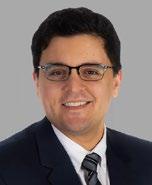 Robert El-Jaouhari
Jake Stewart
Robert El-Jaouhari
Jake Stewart
lor’s degree from North Carolina State University. Stewart is based in Charlotte and focuses his practice in employment and municipal law. Prior to joining the employment law team, Jake handled workers’ compensation matters. He now draws on that experience to provide his clients with comprehensive risk management advice. He is a gradu-
ate of the University of South Carolina School of Law and Roanoke College.
Wright is based in Charlotte and focuses his practice in municipal, employment, and professional liability/malpractice law. Jack is also licensed to practice in Maryland. He is a graduate of the University of Miami School of Law and Appalachian State University.


Cranfill Sumner LLP attorneys serve business and professional clients across North Carolina and beyond from offices in Raleigh, Charlotte, and Wilmington.
Staff report
Commission petitioned to disclose flood history
CHAPEL HILL, N.C. — The Southern Environmental Law Center has petitioned the North Carolina Real Estate Commission to require sellers to disclose to potential buyers information about past flood damages on behalf of Natural Resources Defense Council, North Carolina Justice Center, MDC, North Carolina Disaster Recovery and Resiliency School, Robeson County Church and Community Center, and NC Field, according to a news release from the center.
Providing this information to buyers would allow them to make fully informed decisions about the home they choose to purchase, the risk of flooding at a property, and investments they may want to make in order to address the risk of flooding.
Currently, the Real Estate Commission only requires that property sellers disclose whether a home
is in a floodplain or subject to a flood hazard, the release stated. However, this vague language falls short of best practices for flood hazard disclosure because it does not share the information necessary for buyers to know a property’s flood history, including actual damages, costs of flood insurance, or whether previous owners ever received federal disaster assistance, in which case flood insurance is mandatory for all subsequent owners of the property. Other coastal states that face similar exposure to floods and hurricanes, like Louisiana and Texas, already ensure that homebuyers are given information about a home’s flood history before purchase.
The Residential Property Disclosure Act requires the North Carolina Real Estate Commission to develop a standard disclosure form that must be used in residential real estate trans-
actions. The petition for rulemaking to the North Carolina Real Estate Commission requests that it amend the mandatory disclosure form to require more explicit information about flood history and risk, adding much needed transparency to real estate transactions.
A recent study found that unsuspecting homebuyers in North Carolina could incur tens of thousands of dollars in unanticipated damages over the lifetime of their mortgage, due to the state’s lax disclosure requirements. An analysis by NRDC found that North Carolina has one of the weaker disclosure policies in the nation when it comes to flooding.
“A home that is flooded once is likely to get hit again, and buyers should have the right to know that information...” said Joel Scata, senior attorney, NRDC.
18 JANUARY 2023 | NORTH CAROLINA LAWYERS WEEKLY NEWS
Jack Wright
‘Materially adverse’ standard applies to federal employees






The 4th U.S. Circuit Court of Appeals has applied the private sector “materially adverse” standard for retaliatory conduct to reverse the dismissal of a federal employee’s racebased retaliation and harassment claims under Title VII.
The court held that Title VII’s federal sector provision incorporated its private sector anti-retaliation provision.
“Our examination of Title VII’s text [and relevant case law] compels us to hold that the ... ‘materially adverse’ standard applies to private employees and federal employees alike. That conclusion is in line with the majority view of the other circuits to address the question,” Chief Judge Roger L. Gregory wrote.
Judges Robert B. King and Pamela A. Harris joined Gregory’s opinion in Laurent-Workman v. Wormuth (VLW 022-2-250).
Ongoing insults


Marie Laurent-Workman, an African American woman, began working for the U.S. Army as a civilian in November 2017 at a base in Belgium. Soon one of her co-workers, a white Dutch woman named Dorothea Adams, started harassing her.
Laurent-Workman claimed that Adams often said “Blacks cannot speak properly,” complained that she couldn’t understand them and referred to Black soldiers as “these people.”
Their supervisor, Jasser Khalifeh, a white man of Jordanian descent,
favored Adams and refused to address Laurent-Workman’s harassment complaints, per the opinion.
In July 2018, Adams angrily said NATO did “things differently than ‘you people,’” and hurled insults while following Laurent-Workman as she fled to her office.
During a meeting with another supervisor, Laurent-Workman was asked if she liked her job in a way that she believed was intended to dissuade her from further complaints.
Laurent-Workman also heard Khalifeh tell colleagues in September 2018 that Black male athletes excelled in sports because “the slave masters had bred the strongest slaves together.”
NORTH CAROLINA LAWYERS WEEKLY | JANUARY 2023 19 COURTS
The U.S. Court of Appeals has held that Title VII’s federal sector provision incorporated its private sector anti-retaliation provision. Photo/DepositPhotos
See Page 20
B y n iCK H UrSton • Btm w Ire s erVIces
In a meeting about the harassment in November 2018, Adams allegedly mocked and screamed at LaurentWorkman before violently storming out of the room.
Laurent-Workman eventually filed a Title VII discrimination complaint with the EEOC, but apparently that only made the harassment more oppressive. She decided to apply for a job in another department. An inadvertently forwarded email between one of the selection directors and Khalifeh revealed that the two had mockingly discussed her application.
She didn’t get the job, and the harassment continued until she resigned in August 2020.
Laurent-Workman sued the Army, alleging that she experienced a hostile work environment due to racebased harassment and retaliation by her supervisors through both discrete acts and a hostile work environment.
A U.S. District Court construed Laurent-Workman’s failure to be selected for the job she applied for as the sole basis for her retaliation claims and granted the Army’s motion to dismiss.
The court also dismissed her hostile work environment claims because the length of time between Laurent-Workman’s Title VII complaint and her non-selection didn’t permit an inference of causation, and because she didn’t plead objectively severe or pervasive conduct.
Laurent-Workman appealed.
Hateful workplace
First, Gregory rejected the lower court’s conclusion that LaurentWorkman’s allegations were too sporadic and not severe enough or related to her protected characteristics.
“Even though they do not depict daily misconduct, Laurent-Workman’s allegations demonstrate a series of hateful workplace encounters that consistently targeted her racial iden-
tity,” the judge wrote.
Finding that the conduct was “neither isolated nor a symptom of trite differences,” Gregory said “LaurentWorkman’s allegations describe just the sort of workplace behaviors that Title VII serves to root out — repeated invectives of an overtly racial tenor.”
‘A multi-act story’
Title VII forbids employment discrimination based on race, color, religion, sex or national origin, and extends that protection to federal employees through a federal sector provision that provides: “All personnel actions affecting employees or applicants for employment ... in executive agencies ... shall be made free from any discrimination based on race, color, religion, sex, or national origin.”
In 2006, the U.S. Supreme Court held in Burlington Northern & Santa Fe Railway Company that Title VII retaliation required “materially adverse” conduct that would dissuade a reasonable worker from reporting complaints.
The Army argued that Burlington Northern only applied to private sector claims of discrete act retaliation. But Gregory cited an unpublished Fourth Circuit opinion which held that Burlington Northern controlled both federal and private sector employee claims.
That opinion also said the federal sector provision’s regulation of “all personnel actions” includes a broad range of activity.
Based on that holding, the Fourth Circuit panel concluded that “the federal-sector provision incorporates by reference the anti-retaliation provision [and] adopts the standard applicable to the anti-retaliation provision.”
Noting Laurent-Workman’s several accusations of harassment, Gregory wrote that while “any one of these allegations does not amount to much when considered in isolation, ‘[t]hese
determinations depend on the totality of the circumstances, as [a] play cannot be understood on the basis of some of its scenes but only on its entire performance, and similarly, a discrimination analysis must concentrate not on individual incidents, but on the overall scenario.’ Together, the allegations tell a multi-act story of undermining, gaslighting, and disruption. She has adequately pled that a reasonable employee may have been dissuaded from following through with her complaints due to Khalifeh’s conduct.”
Causation
However, the court rejected the Laurent-Workman’s discrete act retaliation claim, saying she “failed to allege a non-speculative link between her Title VII claim and her non-selection” for the job she applied for, given the two-month gap between the events.
“Causation can be shown in two ways: by ‘show[ing] that the adverse act bears sufficient temporal proximity to the protected activity,’ or by showing ‘the existence of facts that suggest that the adverse action occurred because of the protected activity,’ or a combination of the two,” Gregory wrote. “Laurent-Workman’s allegations support neither showing.”
‘Further guidance’ for courts
Annapolis attorney Ruth Ann Azeredo, who represented LaurentWorkman, said the 4th Circuit’s decision allows her client to move forward with her hostile work environment claims against the Army in Eastern District of Virginia. While they didn’t succeed in having all claims revived, she is heartened by the court’s ruling.
“The decision emphasized the purpose of Title VII and the wrongful conduct it was designed to address,” she noted. “By doing this, it is a
20 JANUARY 2023 | NORTH CAROLINA LAWYERS WEEKLY COURTS
Continued From Page 19 See Page 33
‘A TOTAL WOW MOMENT’
South Carolina Paralegal Terri Coker re ects on receiving NALS mentorship award
 ■ BY TERI SAYLOR
■ BY TERI SAYLOR
Terri Coker was overcome with emotion when she realized she was receiving a national mentorship award from NALS – the National Association of Legal Support Sta at its annual conference last fall in Charlotte.

She remembers the windup leading to the big announcement during a luncheon, taking notice as the announcer began describing all the award-winner’s achievements. And it slowly started sinking in.
“By the time she listed the winner’s fourth achievement, I allowed myself to believe it was me, and I immediately turned to mush,” Coker said, laughing at the memory during a recent Zoom interview. “I didn’t even know NALS had that award.”
Coker is a litigation paralegal at Bannister, Wyatt & Stalvey of Greenville, a job she has held for a decade. She started her career
in corporate law, and to say she loves being a paralegal is an understatement.
“A er I started the litigation job, I have not looked back. Not one single second. I love what I do,” she said.
She also loves her boss, Bill Bannister, the rm’s co-founder, going strong at 83.
“Mr. Bannister still practices full-time, and is just as sharp as ever,” she said. “He has two sons who are also attorneys at the rm – James W. Bannister and Bruce W. Bannister who is in the South Carolina
House of Representatives.”
Bannister & Wyatt is a rm of 10 attorneys, and Coker appreciates that her boss shares her devotion to education and service to the legal profession, including mentoring young paralegals and students.

Her passion for paying it forward goes all the way back to her childhood.
Coker, 58, is warm and folksy. A few minutes of chatting is all it takes to become her friend.
She was born in Alabama and grew up in Greenville, as an impressionable youngster who was in uenced by musicals like Hello Dolly. She wanted to grow up to be a singer and an actress.
But by the time she reached high school, more practical dreams took root.
She had watched two of her teachers move on to lo
positions in law and gov-

y
■ S ee MOMENT Page 26
JANUARY 2023
Publication of
Weekly and
Weekly
Yenli Gaytan, left, and Terri Coker confer in a conference room. Photo/Provided Terri Coker, right, receives her NALS mentorship award. Photo/Provided
A
North Carolina Lawyers
South Carolina Lawyers
“Receiving that award was a total wow moment because I believe that when you’re doing something you’re passionate about, that by itself is your reward. I feel like I have come full circle, and it’s pretty awesome.”
- Terri Coker
OVERHEARD AT THE WATER COOLER

Your 2023 plan for recruiting paralegals




We are in an extraordinary hiring time with the pandemic:
can’t write, but because they want a job quickly and they don’t want the additional hassle of preparing the writing sample. While recent graduates are likely to have a writing sample ready, experienced candidates most likely will not.
• 3 million women left the workplace in 2020, leaving the U.S. with 10 million available jobs and 9 million available candidates
■ BY CAMILLE STELL
• One in 3 labor force participants in the U.S. is a millennial
• 65% of employees claim their stress levels have skyrocketed over ve years
• Happy employees are ve times more likely to stay


One of the most frequent questions I get asked is about hiring paralegals. While there is no one way to recruit and hire, here are my best practices for hiring paralegals.
Hiring Trends
Law rms are known for being notoriously slow in hiring. One of my favorite jobs took me ve months to get a er making the initial contact. I was employed at the time, but ve months is a long time to wait. Job candidates tell me they can go weeks or even months without hearing a status update from a potential employer. While I was willing to wait ve months, this scenario is unlikely to work in your favor in today’s employment climate.
Candidates are hard to come by and they move fast. If you have a long hiring process, the candidate is likely going to take another o er that comes in faster. If your requirements are more stringent than another rm, they’ll likely take the other o er. As an example, if all other things are equal and you are the only rm to require a writing sample, the candidate will choose the other rm. Not always because they
Many law rms hire slow and re slow. In today’s market, if you don’t hire fast, at least try to hire faster. And by 90-days, you should have a good sense of whether a candidate will work. If not, don’t put o the inevitable, release them a er a 90-day trial period before you’ve invested too much time and resources down the wrong path.
Online Recruiting
Post your jobs on LinkedIn, ZipRecruiter or other online job options. Your post can be as formal or as informal as works for you. Some rm members post on their personal LinkedIn account, “My rm is hiring, this is a great place to work, send me your resume if you’d like to join the team!” If you are trying to decide the appropriate message for your rm, view how other companies and rms are posting jobs on the various platforms.
Also, post your position on job banks or career centers o ered by paralegal schools, paralegal associations, and bar associations, such as the NCBA Career Center.
Recruiters
Recruiters are o en a last resort for some law rms because of the fees. However, when your time is money, working with recruiters is an investment in your rm. You don’t need a recruiter to hire an entry level candidate but working with a recruiting rm to hire an experienced or specialized paralegal can provide you with access to candidates you otherwise might not have had.
A recruiting rm has access to a database of candidates, as well as having recruiters search for candidates directly or through their network of contacts. Recruiters can provide background searches, personality tests or skills testing, as
well as the rst round of interviews. If you work regularly with recruiting rms, they will begin to know you, your rm, and the type of candidates who would be good ts. Many recruiting rms also o er to refund fees if the candidate does not last a minimum amount of time in the job.
Paralegal Programs
Some rms don’t want to invest in recent graduates. However, the inside of the classroom today looks different than 30 years ago. It’s always been true that many paralegal students are second career students. While they may not have written a motion or searched a title, paralegal school is a di erent learning experience from law school. Law school tends to be more theoretical while paralegal school is practical. You learn to dra the document, how much the ling fee will be, and how to get to the courthouse. Yes, hiring a recent graduate may require more time investment from you, but take the long view that this is an investment in your rm. Invest the time to develop a plan for training and a training manual outlining the rm’s process and procedures. Your rm doesn’t have those? en train the paralegal and ask them to develop the training plan for the next new hire.
Internships
Working with paralegal programs to hire interns is a great way to introduce your rm to the school and to start meeting students who you might end up hiring. Sometimes, students can get classroom credit for internships, other times, you may need to pay a salary, but either way, this can be a great way to get additional help for the o ce, meet potential job candidates, and contribute to the education of another legal professional.
e ABA has a directory of ABA
■ S ee Page 3
Approved
22 JANUARY 2023 CAROLINA PARALEGAL NEWS
JANUARY 2023 CAROLINA PARALEGAL
n NCBA Paralegal Division and Family Law Section Schedules advice clinic in Guilford County


e N.C. Bar Association Paralegal Division and the Family Law Section is partnering for a Pro Se Custody and Family Law Advice Clinic in Guilford County. e clinic is set for February 11, 2023 from 9 a.m. to noon at Elon Law School.
e Paralegal Division is recruiting paralegal volunteers for virtual intakes. e Family Law Section will be recruiting volunteer attorneys and Elon Law School students for the day of the clinic.
On the day of the clinic, paralegal and law student volunteers will be paired with attorney volunteers to assist eligible clients to complete forms speci c to their legal need or to provide advice only regarding their legal situation.
is clinic is modeled on an April 2021 clinic in Wake County. is pilot clinic was held at the Blanchard Community Law Clinic and successfully served eleven clients by answering their family law questions and dra ing pro se custody packets for several of them.
Visit the Bar Blog for more information and sign-up forms https://bit.ly/3PKxEZ3
n Horton & Mendez expands office and hires new staff


Horton & Mendez a Wilmington-based law practice focusing on personal injury andwrongful death, has moved to larger o ces to accommodate its expanding
practice. With this move at 6105 Oleander Drive, the rm recently hired Leigh Hicks and Catherine Holland.
Hicks joins the rm as a case manager. Holland joins the rm as a paralegal, having previously served as a paralegal at a large insurance defense rm. She has been a litigation paralegal for 10 years.
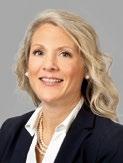
n Ward & Smith human resources coordinator joins Durham Tech Paralegal Advisory Committee

Last fall, Durham Technical Community College appointed Ward & Smith human resources coordinator Jessica Denoyer to a two-year term on its Paralegal Technology Advisory Committee.
e committee provides guidance and advice on the paralegal program at Durham Tech, helping to ensure that it meets the needs of students and the community. Durham Tech is one of many regional community colleges and high schools Ward and Smith has partnered with since 2021 for the rm’s Sta Internship Program, which provides students with exposure to the many facets of the legal profession and hands-on experience in a law o ce.
n Leunora Ward receives state paralegal certification
Cran ll Sumner has announced that Leunora Ward is a
North Carolina Certi ed Paralegal (NCCP) a er passing the paralegal certi cation exam through the North Carolina State Bar.
Ward is a Nurse Paralegal based in the rm’s Charlotte o ce. She has more than 20 years of medical-surgical, cardiac, hematology, and pediatric experience as a registered nurse and is a graduate of Winston-Salem State University and the University of North Carolina at Chapel Hill.
n NALS of North Carolina Membership Meeting–open to guests
NALS-NC invites legal support sta to participate in a virtual meeting on January 23 to learn about CPE/CLE opportunities in 2023. Topics include information about a free CPE webinar in legal ethics and a free CLE from the NALS national on-demand library. Participants will also learn about the state chapter’s history and its vision for the New Year. e meeting starts at noon. Visit https://www.nals-nc.org/ meetings-education to learn how to join the meeting.
n LSPSC membership and education meetings coming in 2023
Legal Sta Professionals of South Carolina have membership and education meetings coming up. On January 21, join the association in Columbia for their
Winter Membership Meeting and CLE. LSPSC will also hold its 58th Annual Meeting and Education Conference at Hilton Head April 22-23. Visit http:// www.lspsc.org/Calendar.html to learn more.
n
LSPG
schedules lunch & learn meetings
Legal Staff Professionals of Greenville holds regular lunch and learn meetings on the third Wednesday of every month from 12:30 to 1:30 p.m. at the Poinsett Club. “Lunch & Learns” provide educational speakers and offer one-half hour of CLE credit. For reservations, speaker information, and/or menu selections, contact Tara Jean Brown, PP, PLS, SCCP at 864.271.7940 or Tara@ davidgreeneattorney.com. Visit http://www.lspg.org/Calendar. html
n 2023 NALA Conference & Expo
NALA, the Paralegal Association will hold its 2023 Conference July 12-14, 2023 at the Westin Copley Place in Boston. Visit https://nala.org/education-5/nala-conference-expo-2023/
n 2023 NALS Conference
The National Association of Legal Support Professionals will hold its 2023 National Conference in Houston August 21-23 at the Hotel Derek. The association is seeking speakers and has posted a call for presentations. Visit https://www.nals.org/ page/2023conference.
CAROLINA PARALEGAL NEWS
BRIEFS
Jessica Denoyer
23
Leunora Ward
NEWS
Q&A: MCKELA SIMON
McKela Simon strives to grow as a paralegal
Growing up in Lamar, S.C., a small town in the Pee Dee Region of the state, McKela Simon enjoyed life in a large family with both parents and eight siblings. She was attracted to law at a young age.
“I grew up interested in the legal system,” she says. I was fascinated by the real life situations I saw in the news, and lived with in my own family.”
She most enjoys working behind the scenes in roles vital to the work attorneys do every day.
A er earning an associate degree, she went on to get her bachelor’s degree from South University.
She is working on her Master of Law degree from Regent University while working full time at Poulin | Willey | Anastopoulo as a litigation paralegal, focusing on personal injury and workers’ compensation.
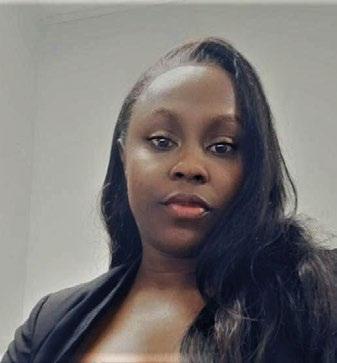
She aspires to advance in her career to the rank of senior paralegal or even a paralegal supervisor.
I became a paralegal because. e reasons I want to be a paralegal are both professional and
■ Continued from Page 22
Paralegal Education Programs - Approved Programs Directory (americanbar.org).




e NC Paralegal Association has a list with 36 paralegal programs located in North Carolina - Paralegal Educational Program Listings (ncparalegal.org)
Maintain a pipeline of potential job candidates. Internships are one way to accomplish this, another is to hire college students who are considering law school. While this may result in a candidate who will only be with you for a few years, you may nd the student decides to attend paralegal school instead of law school, or you will gain an introduction to a potential lawyer hire.
Look for non-traditional candidates. Anyone who has worked in customer service will know
personal. I am driven to help the general public which in turn is helping me. My work as a paralegal has helped me enhance my communication and people skills. I was drawn to this area because I can advance with my law rm along with my career and I am learning as I go.
Favorite aspect of work. My favorite aspect of being a paralegal is having the opportunity to make a di erence by improving our clients’ quality of life.
Advice to those considering the profession. e rst thing I would tell a future paralegal is to avoid excuses and develop a plan by identifying both short- and long-term goals that will lead to success. Always ask questions because no question is a stupid question. Also, I would say always be assertive. Never rely on guesswork because having to re-do work only hinders your completion of the next tasks.
Others may not know. I strive to be humble. I do demonstrate pride in myself, but not to put others down.
In my spare time. I sometimes read or review cases I worked on the week before. I go to net-
how to deal with clients, whether they worked in a call center, a restaurant, or retail job. Also, people who have worked in other professional services such as nance or accounting will have many transferrable skills. e legal skills can be taught on the job or by sending the employee to take paralegal classes or CLE programs.
Also, look for candidates who may not be looking for you. Some high school students or college students have never been exposed to the legal eld. Hire them in to answer phones, scan documents or other administrative tasks. You may help someone discover a new eld of interest and if you are lucky, perhaps they will continue to work for you while attending school and join your rm a erwards. Local schools are always looking for working professionals to come into high schools, colleges, or
working events. I spend time with my family. I also take classes to advance my paralegal skills. Work/life balance. I leave work at work, and I leave home at home. And I practice self-care. I make sure I engage in productive personal activities and avoid taking professional problems home.
job fairs to encourage students.
Recruiting is a multi-prong e ort. Commit your ideas to a written plan with implementation dates. Interviewing candidates for summer positions may happen in the winter semester of classes. Working paralegals who have completed paralegal programs may be ready to look for new jobs in May or June as they approach graduation. Online recruiting is available anytime but creating the job description and posting it takes time. View these e orts as investments in the rm and you will see results over time.
Camille Stell is the President of Lawyers Mutual Consulting & Services and the co-author of the newly published book, RESPECT – An Insight to Attorney Compensation Plans available from Amazon. Continue this conversation by contacting Camille at camille@lawyersmutualconsulting.
24 JANUARY 2023 CAROLINA PARALEGAL NEWS
McKela Simon
Q&A: CASSANDRA FURTICK
Medical records certification paves a path to law firm career




Mother of ve children, native of El Monte, Calif., and paralegal at the Solomon Law Group in Columbia, S.C., Cassandra Furtick followed a winding path into her career.

She spent most of her growing up years in Swansea and graduated from Swansea High School where she played in the band.
“ rough music, which was a big part of my life, I was able to play in the marching band, jazz band, regional band, all-state band, and I even played in the governor’s all-state band,” she says.
She graduated from Fortis College with a medical assistant certi cation, intending to work in the health care eld, but found that getting her foot in the door was more di cult than she imagined. en she interviewed for a position handling medical records for the Solomon Law Group and never looked back.
“I have worked my way from medical records assistant to litigation paralegal, regularly assisting clients with personal injury claims, and becoming a key professional in that process,” she says.
Furtick also co-owns Furtick Creations, a small business that makes personalized and customized gi s ranging from cups and t-shirts to cutting boards. Her entire family are business partners, and she views this as an investment in the children’s future.
Focus area: I am a personal injury litigation paralegal. A er losing someone very close to me, I wanted to make a di erence. I have found that this is an area that not only satis es that desire, but also allows me to help make a di erence in our clients’ lives. Working in personal injury, I not only assist our clients in their time of need through treatment, recovery, and resolution of their claims, but many of my clients become like family. We help them ease the emotional toll these cases take on them
and help them navigate life a er the claim. Our goal is to make this process as easy as we can so they can focus on healing. Seeing our clients smile at the end of their cases makes everything worth it.
Motivation: It does make it a lot easier to come to work for an employer who treats you with respect and has the same vision for the community that you do. It is rare to nd someone like Carl Solomon who is as equally invested in me as a worker as he is as a person. At the end of the day, I o en spend as much time at work as I do at home, so loving where I work is important. Having a place to come to, where I enjoy what I do, makes it easier to get up and go to the o ce.
Challenges: In the legal eld and medical eld, there is always a constant change. One day you may speak to a provider at one location, and the next week you will nd that the company is now owned by someone else. e law is also changing by the day. With that being said, I enjoy a challenge. I love the fact that I am always learning, and no day is ever the same.
Great customer service: Delivering what you promise to deliver, and being a nice person is my de nition of great customer service. You never know what your clients are going through. What you see in records is not always the totality of their case. Each person handles their personal incidents di erently. Our clients have hired us to do a job, we take the responsibility very seriously, and we deliver on our promises with compassion and kindness. at kindness also extends to our community. A smile and a kind word doesn’t cost anything.
Early ambitions: I was always interested in learning and loved every bit of school. I was determined to be a math teacher when I was a little girl. In middle school, my goal changed
to becoming a band director. It wasn’t until my early 20s that I decided on my career path, and in my late 20s I found my love and my true career. As a paralegal, I still get the satisfaction of teaching seminars on medical records and even train paralegals. I love that I can combine my love for teaching and my love for the legal eld.
Advice to teenage self: Hang on and everything will work out. Don’t try to take any shortcuts. Everything you go through will make you who you are. ere are many lessons to learn throughout life. You may not see it immediately, but in the end you are happy.
Down time: I spend down time crocheting. I love to make blankets, especially Afghan blankets. I also enjoy creating personalized gi s for my customers. We work in a high stress environment, so having something that is relaxing to take my mind o things can really help me manage my stress level. Plus, it adds a special bonus of seeing other people happy when I share one of my creations with them.
25 JANUARY 2023 CAROLINA PARALEGAL NEWS
Cassandra Furtick
MOMENT / ‘... I have come full circle’
said.
ernment.
“One was my English teacher who was resigning from teaching to become the administrative assistant to then Governor Carroll Campbell,” she said. “And I thought ‘wow, to go from English teacher to the governor’s ofce is amazing.’”
Her next inspiration came a few years later when another of her English teachers was appointed as a magistrate judge.

“I thought, there is something going on here, and I want to be a part of it,” she said.
At the time, Coker was a student in a vocational school, studying to be a cosmetologist and was a member of the school’s chapter of Vocational Clubs of America. She was also on the school’s parliamentary procedure team, and participated in competitions all over the state, even making it to the nationals.
“We won second or third place at nationals, and I knew right then I no longer wanted do hair for a living,” she said. “Instead, I wanted to work in a professional environment.”
Coker’s rst job out of school was as a word processor at Daniels Construction, now known as Fluor Enterprises in Greenville. She progressed to the company’s legal department where she worked for the corporate attorneys.
“ ere’s nothing that makes you feel more highfalutin than working in an o ce with 12-foot mahogany walls,” she said, laughing.
Along the way, Coker made her way out of her corporate workplace and into law rms. She admired Ann Armstrong, a fellow paralegal who also taught continuing education classes and inspired her to seek a paralegal education.
“At the time, I was a single mom with a daughter just over the age of 3, and the only place I knew of where I could get a paralegal-focused education was in Atlanta, and that was completely out of range for me,” she
During the 2008 recession, Coker found herself laid o from her job at a solo practitioner’s law o ce and landed a new part time role in another rm. It wasn’t enough for the high-achieving paralegal.
“To go from a full-time job to working half days, I wondered what on earth I was going to do with the rest of my time,” she said.
She discovered that Greenville Technical College had started o ering an ABA-certied paralegal curriculum, so she lled her extra time with schoolwork and got the education she had been dreaming of for two decades. It was an eye-opening experience.
“I remember sitting in class at the age of 40, looking around at my fellow students, and I knew I had to pull out all the stops to be competitive with the younger crowd,” she said. “So I did everything I could to maintain the highest GPA possible.”
She earned her paralegal certi cate and holds both state and national certi cations. She’s active in both Legal Sta Professionals of South Carolina and Legal Sta Professionals of Greenville, both NALS chapters, and she holds leadership positions in both organizations.
Along with her education, came her passion for mentorship.
A partnership between Greenville Tech and two local paralegal associations–LSPG and the South Carolina Upstate Paralegal Association, gives working paralegals the opportunity to mentor and advise students.
At the start of each semester, students can interview the paralegals to learn about their jobs. At the end of the semester, the paralegals turn the tables and conduct mock interviews with the students to prepare them for the job market.
By the time the students graduate, they have a good idea of what it is like to be a professional paralegal, and enough experience to start their careers.

For Coker, mentoring is like a ministry.
“I get such joy from meeting the new students,” she said. “To me, mentoring means encouraging them, pouring my knowledge into them, and being a go-to person so they can count on me.”
For Coker and her law rm, mentorship has paid o in a tangible way.
Last year, she conducted a mock job interview with a student named Yenli Gaytan.
“She was so impressive, and as a matter of fact, she won the NALA Paralegal Student of the Year Award for 2022,” Coker said. “ at was huge.”
A few months ago, Coker learned her rm was planning to hire a paralegal and seeking a young person right out of college.
“I told them, ‘I’ve got just the one for you,’” Coker said. “We hired her right away, and the rm has let me take her under my wing and teach her what it’s like in the real world.”
Even in Coker’s own family, her passion for her work is making a big impact and may just be the best result of her mentorship e orts so far. Her own son is planning to enroll in Greenville Tech’s paralegal program and follow in his mother’s footsteps.
“He’s 25 years old, and he asked me a few weeks ago to tell him about what it’s like to be a paralegal,” she said. “ e college is offering free tuition for the spring semester, and he’s getting his ducks in a row to enroll.”
When Coker looks back on her national mentorship award, the talented paralegal she hired for her rm, and her son who wants to follow her career path, she realizes the impact her work is making on her profession.
“Receiving that award was a total wow moment because I believe that when you’re doing something you’re passionate about, that by itself is your reward,” she said. “I feel like I have come full circle, and it’s pretty awesome.”
Teri Saylor is a freelance writer in Raleigh, N.C.


26 JANUARY 2023 CAROLINA PARALEGAL NEWS
■ Continued from Page 21
QUESTIONS WITH...
Taylor Dewberry
In 2021, employment law attorney Taylor Dewberry was named Smith Anderson’s first chief diversity officer. Her practice focuses on employment-related counseling and defending employers against claims involving discrimination, wrongful discharge, retaliation, harassment, and civil rights claims.
After graduating with honors from Stanford University in 2014 with her bachelor’s degree in American studies and a minor in African American studies, Dewberry got her J.D. at Washington University School of Law in 2017. Since then, she has worked as an attorney at Smith Anderson in Raleigh.
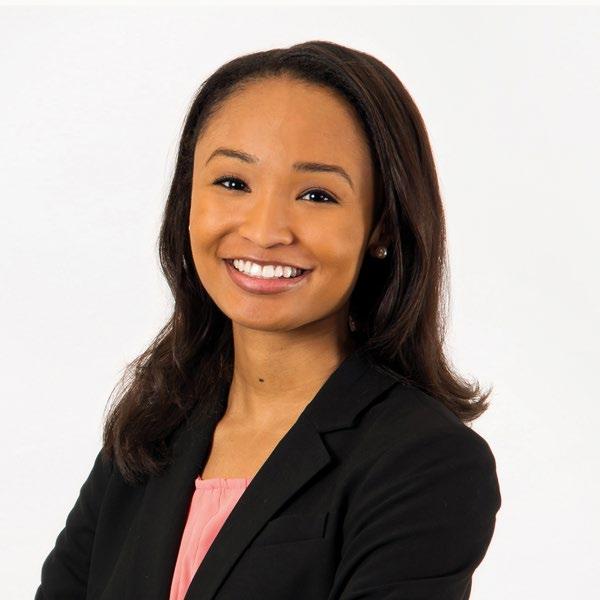
Dewberry has been recognized by
Best Lawyers, “Ones to Watch,” The National Black Lawyers Top 100, Top 40 Under 40, and Executive Notes Editor, “Washington University Journal of Law and Policy.”
Dewberry’s memberships include District 9 representative, Young Lawyers Division, American Bar Association; co-chair, Diversity and Inclusion Committee (2018-22) and co-chair, Disaster Legal Services Committee, Young Lawyers Division, North Carolina Bar Association; Wake County Bar Association; and executive board member, Black Law Students Association.
In the following Q&A, Dewberry chats with North Carolina Lawyers Weekly about diversity, equity, and inclusion initiatives.
pro-
A: To create a sustainable yet engaging DEI program, the company must create a program that is both focused on a diversity mission and also adaptable to changing cultural movements and current issues. For example, the company could have a focused mission to support employee resource groups to encourage greater inclusion and also be open to additional employee resource groups that its employees suggest.
NORTH CAROLINA LAWYERS WEEKLY | JANUARY 2023 27
Q: How do you create a sustainable DEI
gram that keeps the issue at the forefront of employee’s minds?
FEATURE
5 1
Q: What is the best piece of advice for a company that is crafting or adjusting its DEI strategy?
A: In crafting a DEI strategy make sure that DEI efforts are not expected to be fully run and managed by diverse employees alone, make sure that you encourage ally employees to participate and share the workload for DEI initiatives. The benefit is three-fold: (1) there are more hands for the workload; (2) there are more opportunities to share information between groups; and (3) it shows that employees of all backgrounds are committed to the DEI mission.
Q: How do you best measure diversity and representation across all levels of an organization?
A: Diversity is a challenging metric to evaluate because diversity has different meanings to different people. Companies should look around at their metaphorical “tables,” and ask themselves whether there are a variety of voices, perspectives, backgrounds, and outlooks who have a seat at their tables and if not, take steps to change that. For example, recruiting in places where there are diverse candidates and encouraging diverse employees to pursue leadership roles.
Q: How has a post-COVID pandemic workforce with high turnover affected DEI strategy implementation?

A: The strategy remains the same – to create a workforce where everyone is appreciated for what makes them unique and is included despite their differences. Adding new employees to the mix only creates new opportunities to bring employees into the company culture and get new ideas and perspectives from them.
Q: What inspires you as you lead your company’s DEI efforts?
A: I am inspired to create a workplace that allows employees of all backgrounds to feel included and bring their authentic selves to work each day. In being authentic at work, we will create a safe haven for fostering new and fresh ideas.
Explore our archives of stories and case digests to find that decision you remember.




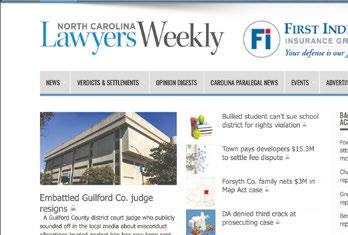

copies of the full-text opinions you need.












verdicts and settlements to compare what your case is worth or to see what experts have been used. It’s all part of your subscription.



28 JANUARY 2023 | NORTH CAROLINA LAWYERS WEEKLY FEATURE
2
4 5
3
Start your research with North Carolina Lawyers Weekly.
Explore our online resources today! nclawyersweekly.com/subscribe
I am inspired to create a workplace that allows employees of all backgrounds to feel included and bring their authentic selves to work each day.
Get
Research
Shumaker partner renamed secretary of board
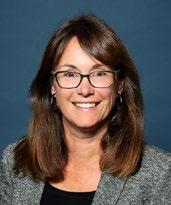
Shumaker partner and corporate, tax and transactions regional service line leader Joseph J. (Jack) Santaniello has been renamed secretary of the SHARE Charlotte Board of Directors, where he has served since 2020.
“We are so thrilled to have Jack remaining on our board of directors! He brings a wealth of knowledge and insight and has been critical to SHARE Charlotte’s growth since he joined three years ago, especially during a time of leadership transition for our organization. Jack is community-minded and is always looking for ways that help foster connections that can be beneficial and impactful for our local nonprofit community,” said Melissa Hovey, SHARE Charlotte Managing Director.
SHARE Charlotte recently celebrated its 10-year anniversary building a better Charlotte by empowering nonprofits and helping people invest in their communities in ways that matter most to them. The organization partners with more than 600 nonprofits and provides the community with volunteer opportunities, events, and a unique online shopping experience called Give Shop®, where users can purchase items nonprofits need to run their programs and business. SHARE envisions a Charlotte united through good.
“I am proud to be part of the SHARE team and to help drive the organization’s initiatives of volunteerism and passion for community engagement, which positively impact the lives of all Charlotteans,” Jack said.
Albright named managing partner of Law Firm Carolinas
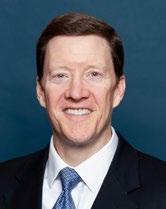
Carole Albright has been named
Managing Partner of Law Firm Carolinas, which has six offices in North and South Carolina.
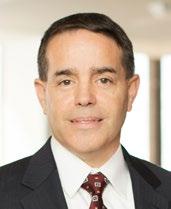
Marshall named partner at Law Firm Carolinas
Adam Marshall has been named a partner at Law Firm Carolinas. His practice includes community association (HOA and condo) law as well as land use, zoning and planning issues.

Attorney authors new book on meeting procedure
Jim Slaughter, a partner at Law Firm Carolinas, has a follow-up book to his Robert’s Rules of Order Fast Track, released earlier this year. Notes and Comments on Robert’s Rules, Fifth Edition is a user’s guide to meetings and Robert’s Rules of Order that uses a question-and-answer format to cover the most misused and asked-about provisions, particularly as to larger meetings. Notes and Comments previously received the Phifer Award from the National Communication Association.
Taliercio re-elected president of Parliamentary Lawyers
Michael Taliercio, a partner at Law Firm Carolinas, has been re-elected President of the American College of Parliamentary Lawyers. ACPL was created in 2007 to acknowledge attorneys who have distinguished themselves through
contributions to the practice of parliamentary law, including lawyers that work with HOA and condo associations, nonprofit corporations, houses of worship, and governmental bodies. Taliercio is a Professional Registered Parliamentarian with the National Association of Parliamentarians.

Smith Anderson welcomes eight new attorneys
Smith Anderson, the largest business and litigation law firm headquartered in the Research Triangle region of North Carolina, has welcomed eight new attorneys to the firm in the fourth quarter, bringing a record total number of attorneys to have joined the firm in one single year to 20, a news release stated.
Carina Arellano is an attorney with Smith Anderson’s Intellectual Property, Technology Transactions and Mergers and Acquisitions practice groups. Prior to obtaining her J.D. from Arizona State University School of Law in 2022, Arellano served as an admission officer specializing in Latino/x/e student recruitment at Duke University Undergraduate Admissions.
Dani Dobosz is an attorney with Smith Anderson’s Litigation practice group, advising clients on a wide range of business disputes, including contract and business tort claims, employment litigation and non-compete and trade secrets.

Dobosz obtained her J.D. from the University of North Carolina at Chapel Hill School of Law in 2022, where she graduated second in her class and completed an externship for the Honorable Judge James A. Wynn of the U.S. Court of Appeals for the
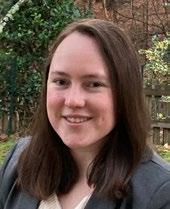
NORTH CAROLINA LAWYERS WEEKLY | JANUARY 2023 29
LAWYERS IN THE NEWS
Fourth Circuit.
Josiah Irvin is an attorney with Smith Anderson’s Regulatory and Public Policy practice group with a focus in health care law.

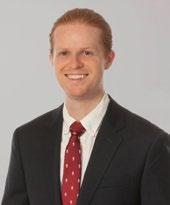
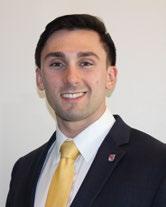
Josiah advises clients on health care matters, including regulatory compliance, reimbursement under federal health care programs and health care fraud and abuse laws, state practice and licensure requirements, insurer regulation and compliance program requirements. Prior to joining Smith Anderson, Irvin was an associate with an international law firm in Washington, D.C. and New York City.
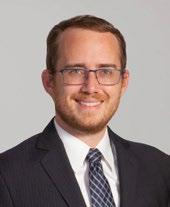
Dave Johnson is an attorney with Smith Anderson’s Corporate and Transactional and Banking and Finance practice groups. Johnson received his J.D. from the University of Virginia School of Law in 2022, where he was membership and inclusion editor for Virginia Law Review.
Justin Lockett is an attorney with Smith Anderson’s Litigation practice group and assists clients with employment and general business litigation matters.
Lockett obtained his J.D. from Campbell Law School in 2022, where he was chief comments editor for Campbell Law Review.
Elizabeth “Liza” Nye is an attorney in Smith Anderson’s Banking and Finance group and focuses her practice on commercial lending, corporate finance, venture debt and other finance transactions. Prior to joining Smith Anderson, Nye worked as an attorney in the Raleigh
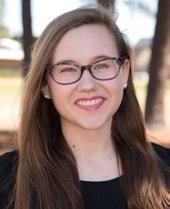
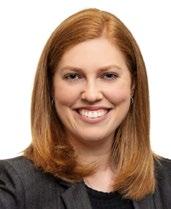
office of an international law firm, as well as for a regional North Carolina law firm, where she represented various lending institutions on real estate and other assetbased transactions.
Sarah Page is an attorney with the firm’s Real Estate Development practice group. Page obtained her J.D. from Wake Forest University School of Law in 2022, where she received the Suzanne Reynolds Awards for the highest grade in many areas, including Contracts, Legal Analysis, IP Innovation and Commercialization, Complex Litigation, Evidence and Real Estate Finance.
Nick Santos is an attorney with Smith Anderson’s Corporate and Transactional practice group.
Prior to joining Smith Anderson, Santos was an associate at an international law firm, where he focused on a variety of deals including new platforms, add-ons, and domestic and international carve-outs.
Nelson Mullins elects four partners
The partners of Nelson Mullins Riley & Scarborough LLP have elected four attorneys from the firm’s North Carolina offices to the partnership effective Jan. 1, 2023, according to a news release from the firm. Overall, the firm elected new partners from 12 cities and eight states and the District of Columbia.
The following attorneys from the firm’s Charlotte and Raleigh offices were elect-
LAWYERS
ed as partners:
• Andrew Brown (Raleigh). Brown maintains a diverse litigation practice ranging from business, employment, and insurance disputes to public procurement protests and constitutional litigation. He has represented both corporations and individuals through all stages of litigation, including trials and appeals in federal and state court, administrative tribunals, and private arbitration.
• Lianna Donovan (Charlotte). Donovan practices in the areas of electronic discovery, records and information governance, cybersecurity and data privacy, and business litigation. She has experience counseling Fortune 500 healthcare and pharmaceutical clients in developing discovery strategies in large-scale litigation and in response to government investigations, including managing document collection, review, and production. She also frequently advises clients on document preservation issues, including the development and implementation of defensible records retention and data disposal programs.
• Jeff Kelly (Raleigh). Kelly focuses his practice in the areas of emerging technology, particularly in areas involving data analytics, digital assets, and FinTech. He works closely with entrepreneurs and companies to effectively navigate changing regulations, government investigations, and complex corporate and securities law challenges. He also represents clients before tribunals and agencies that concentrate on regulating new technology and protecting trade secrets, including the North Carolina Business Court, the U.S. Securities and Exchange Commission (SEC), and federal courts.
• Cory Patterson (Charlotte). Patterson focuses his practice on complex civil litigation, white collar litigation, government and internal investigations, bad faith insurance law, insurance coverage issues, toxic torts/asbestos, and personal injury litigation. He advises insurers, transportation companies, and other businesses on business and litigation strategy.
Brown, Donovan, Kelly, and Patterson are among 32 attorneys elected to partnership in 2023.
30 JANUARY 2023 | NORTH CAROLINA LAWYERS WEEKLY
Staff
report
NEWS
IN THE
VERDICTS & SETTLEMENTS
$$3 MILLION SETTLEMENT
Estate of motorist killed in crash settles for $3M
Is this a verdict or a settlement? Settlement
Type of case: Motor vehicle wreck
Amount: Single Limit Policy Limits Paid Property Damage and Personal Injury Settlement totaled at 3 million
Injuries alleged: Death
Case name: Confidential Court: Mecklenburg County, North Carolina Case No.: Confidential
Date of settlement: September 1, 2022
Demand: Policy Limits
Insurance carrier: Confidential
Attorney(s) for plaintiff and their firm(s): Mark S. Jetton Jr. of Jetton & Meredith PLLC, and Ronald Dixon of Dixon & Hall PLLC
Attorney(s) for defendant and their firm(s): Confidential
Was the opposing represented by counsel? Yes Were liability and/or damages contested? Damages contested
Has the judgment been successfully collected? Yes
By Haviland Stewart hstewart@nclawyersweekly.com
The estate of a worker killed during a collision has reached a $3 million settlement.
On Aug. 4, 2021, the defendant was driving a commercial dump truck on Moores Chapel Road in Mecklenburg County, North Carolina. According to plaintiff attorney Mark S. Jetton Jr., the defendants dump truck veered off the right side of the road and then made an abrupt over correction from the right shoulder into the opposing lane, colliding into the 26-year-old plaintiff’s vehicle head on.
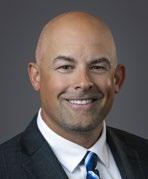

At the time of the accident, the plaintiff was on the job also driving a company dump truck. The head-on collision between the two dump trucks caused the plaintiff’s vehicle to catch fire. Plaintiff and defendant were both pro-
nounced dead on the scene. According to an autopsy report, the plaintiff’s probable cause of death was found to be thermal injuries, with a time of death proximately 18 minutes after the collision, information which Jetton reported to be vital in proving suffering.
“One of the main arguments that I made in the case was just the horrific nature of this death,” Jetton said. “Based on the autopsy, what was found was that he didn’t immediately die on impact but was killed by burning to death. So, we thought the autopsy report was a very key piece of evidence.”
The plaintiff’s estate settled for $3 million on Sept. 1, 2022.
Many details of this case have been withheld due to a confidentiality agreement. ◆
$$10 MILLION SETTLEMENT
Type of Action: Class action; FLSA and State Labor Law Violations
Injuries alleged: Unpaid Overtime Compensation
Name of case: Danford et al. v. Lowe’s Home Centers, LLC Court: U.S. District Court for the Western District of North Carolina
Case Number: 5:19-cv-00041
Name of Judge: Hon. Kenneth D. Bell Verdict, Settlement, Judgment, Or Arbitration/Mediation Award: Settlement and arbitration awards
Amount: $9,950,000: Approximately $7,450,000 from the multidistrict litigation settlement and approximately $2,500,000 from arbitration awards
Date of Verdict or Settlement: Nov. 2, 2022 Attorney(s) for Plaintiff: Kevin Stoops, Jason Thompson, and Jesse Young, Sommers Schwartz, PC, Southfield, Mich. Attorney(s) for Defendant: Gibson, Dunn & Crutcher LLP
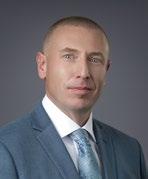
 By Haviland Stewart
By Haviland Stewart
hstewart@nclawyersweekly com
On Nov. 2, 2022, attorneys Kevin Stoops, Jason Thompson and Jesse Young secured a nearly $10 million settlement for 2,574 hourly managers across the nation employed by home
improvement giant, Lowe’s Home Centers LLC.
The managers alleged the company violated the Fair Labor Standards Act by failing to pay them regular wages and overtime compensation for work performed outside of their shifts.
The lawsuit was first filed in April 2019 in U.S. District Court for the Western District of North Carolina and later included 19 more class actions filed in other federal courts across the country. The Judicial Panel on Multidistrict Litigation ultimately consolidated the cases in the Western District of North Carolina. Another 184 hourly managers pursued their claims in individual arbitration proceedings nationwide.
According to plaintiffs’ attorneys, the managers alleged that Lowe’s withheld compensation for “off-theclock” work done when opening and closing stores and performing exterior perimeter sweeps. The employees claimed these tasks constituted compensable work above 40 hours per week, which they deserved timeand-a-half pay for according to the Fair Labor Standards Act and various state wage and hour laws.
The litigation required extensive discovery, including hundreds of written interrogatories, more than 200 depositions, multiple mediations, and 11 arbitration hearings.
NORTH CAROLINA LAWYERS WEEKLY | JANUARY 2023 31
Labor law violation results in a nearly $10M settlement
Mark S. Jetton Jr.
Kevin Stoops
Jason Thompson
Jesse Young
Aside from the large monetary settlement, Lowe’s agreed to make changes to its timekeeping system and compensation policies, resulting in hundreds of thousands of dollars in additional compensation to hourly managers throughout the U.S. that took effect in September 2020.
The settlement totaled at $9,950,000, which consists of approximately $7,450,000 from multidistrict litigation settlement and $2,500,000 from arbitration awards. ◆
$1.4M SETTLEMENT
$1.4M goes to estate of worker killed in prison break attempt
Settlement Report – Wrongful Death and Civil Rights
Amount: $1.4 million
Injuries Alleged: Wrongful Death
Court: Pasquotank County Superior Court; United States District Court for the Eastern District of North Carolina; Fourth Circuit Court of Appeals Date of Settlement: Sept. 12, 2022 Case Nos.: 19 CvS 738 (Pasquotank County); 2:16-cv00036-H (E.D.N.C.); 20-2357 (4th Cir.)
Attorneys for Plaintiff: David Kirby of Edwards Kirby and Cate Edwards of Edwards Beightol in Raleigh Attorney for Defendant: North Carolina Department of Justice
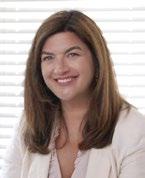 By Haviland Stewart hstewart@nclawyersweekly com
By Haviland Stewart hstewart@nclawyersweekly com
On Sept. 12, 2022, the North Carolina Department of Public Safety paid $1.4 million to the estate of Geoffrey Howe, a maintenance mechanic at Pasquotank Correctional Institution who was killed by four inmates during an attempted pris-
on break.
Howe’s estate was represented by David Kirby, of Edwards Kirby Law Firm, and Cate Edwards, of Edwards Beightol Law Firm, both in Raleigh.

According to the plaintiff’s counsel, the escape attempt started in the sewing plant, operated by Correction Enterprises, where violent inmates worked in violation of DPS policy.
“The State placed known, violent criminals in jobs at the sewing plant,” Kirby said. “Then, they gave them virtually unrestricted access to dangerous weapons, including scissors and claw hammers.”
The four inmates who perpetrated the attack gathered those tools to use in their escape, which started by killing Correction Enterprises Plant Supervisor, Veronica Darden, and taking her keys. The inmates then returned to the plant and brutally murdered Correctional Officer Justin Smith in a storage room that the inmates knew was not video monitored, Kirby reported.
After their initial attack, the inmates moved undetected down an elevator to the ground floor, where they encountered Correctional Officer Wendy Shannon and maintenance mechanic Geoffrey Howe. Due to Howe’s position as a maintenance mechanic, he was never supposed to encounter prisoners through his work.
The inmates used the tools from the sewing plant to attack Shannon and Howe before running to the fence and ultimately being captured.
Howe and Shannon were trans-
ported to the hospital and died within weeks due to their severe injuries. Howe left behind a 3-yearold daughter, parents, and fiancé. The attempted escapees are in the process of being tried individually for murder. The orchestrator of this attempted escape and attack has been convicted and sentenced to death.
According to Edwards, the legal issues in the case were complex. DPS employed extremely violent criminals in the sewing plant, where 30 inmates were supervised by only one correctional officer, DPS also placed claw hammers and other dangerous tools in the plant and failed to adequately monitor the inmates as they moved through different floors of the prison, she reported.
“Despite the difficult legal posture and applicable defenses, this settlement is an indication that the State knew something terrible and preventable had happened to one of its own people, in one of its own prisons,” Edwards said.
The suit involved both State claims and claims under 42 USC § 1983. The case was removed to U.S. District Court, where the Court rejected plaintiff’s claims on grounds of qualified immunity, that decision was upheld by the Fourth U.S. Circuit Court of Appeals. After that decision, the parties reached a settlement.
“This is an incredibly tragic case were a young father died a brutal and senseless death because simple safety protocols were not followed,” Kirby said. “His death, and the deaths of three other coworkers were compounded by archaic notions of governmental immunity that blocked access to civil remedies normally available to everyone except when that injury, or in this case death, comes through governmental negligence.” ◆
32 JANUARY 2023 | NORTH CAROLINA LAWYERS WEEKLY
VERDICTS & SETTLEMENTS
David Kirby
Cate Edwards
reminder that the underlying policy and purpose of Title VII should guide the analysis. The defendant had argued that federal employees, including the plaintiff, have less protection than other employees under Title VII in both substantive claims of discrimination and retaliation claims.”

Azeredo said her arguments includ-
DISCIPLINES
ATTORNEY: BROOKE CRUMP
County: Montgomery County
Bar membership: Since 2017 Disciplinary action: Disbarred
ed that federal employees had the same protections under Title VII as any other employee, and that the standard for a hostile work environment claim based on retaliation was conduct that, in the aggregate, dissuaded an employee from bringing complaints, which is a lower threshold to meet.
“In its opinion, the 4th Circuit Court of Appeals the court aligned with our

position and emphasized that negative racial comments, gaslighting, and acts of sabotage against an employee by a supervisor and co-worker, can, in the aggregate, amount to a hostile work environment,” she pointed out. “The decision provides further guidance to courts below as to pleading requirements at the motion to dismiss stage in hostile work environment claims.”
Background: Following an initial suspension for non-compliance with the grievance process, Crump has been disbarred due to a series of professional misconduct including defamation, misrepresentation and frequent impunctuality and absenteeism to court hearings. Crump’s persistent pattern of misconduct up to and including her actions in connection with this disciplinary proceeding indicate that Crump is either unwilling or unable to conform her behavior to the requirements of the Rules of Professional Conduct. She has been disbarred effective immediately.
LAWYER TO LAWYER / Directory
COMMERCIAL & CONSTRUCTION LITIGATION


John P. Marshall

106 S. McLewean Street P.O. Box 3169 Kinston, NC 28502-3169
252.527.8000 x245 Fax: 252.527.8128 jmarshall@whiteandallen.com
Require
NORTH CAROLINA LAWYERS WEEKLY | JANUARY 2023 33
Your
• All Chapters
• Alternatives
• Receiverships Tough
All Chapters
Alternatives
Receiverships
business partner. Serving Eastern NC 252.633.1930 www.olivercheek.com
of Bankruptcy
to Bankruptcies
Times
Trusted Lawyers •
of Bankruptcy •
to Bankruptcies •
Continued
COURTS
From Page 33
Judicial elections have consequences, too
There’s no shortage of debate, among lawyers at least, about whether to continue electing judges. But no less important is what judicial elections mean for the nature of judging.
In North Carolina, we’ve been electing our judges since Reconstruction. The argument for election isn’t hard to follow. People want to pick the judges they like and remove the ones they don’t. Elections let the people — the source of sovereignty — judge the judges.
Elections matter, of course, but so does the choice to select judges by election. Judicial elections may affect how new judges — especially appellate judges — view their role. What, if anything, should a judge understand about the judicial role when he or she joins the court, unseats an incumbent, or flips a partisan seat?
Any answer includes stare decisis. Whether to adhere to precedent in a particular case is never simple. Judges rely on various factors that affect the stickiness of precedent, but it’s ultimately a question of prudence.
Talk of stare decisis is coming soon to our Supreme Court. In November 2022, voters flipped partisan control of the Court. Partisanship and judicial philosophy, of course, are not dispositive in many or most cases at the Court. But over the last several years, and through 2022, major questions at the Court have been decided along partisan lines. The incoming justices also campaigned on a promise to practice a different judicial philosophy if elected.
And, to be sure, differences in judicial philosophy have generated controversial opinions from the Court.
Consider a sample of decisions from just 2022. In 4 to 3 opinions, a majority recognized the justiciability of partisan gerrymandering claims, allocated public education spending where the legislature refused, and created new limits on the legislature’s power to propose constitutional amendments. These decisions broadened the role of the judiciary in our state system of government.
Judicial power was on the ballot for Election Day 2022. The voters selected candidates who campaigned on a more limited view of judicial power.
These results were not a shock, given recent trends. From 2016 through 2022, Republicans won nineteen partisan, statewide judicial races. Democrats won four. And of those four, in two races a majority of votes were cast for Republican candidates, but a Democrat won by a plurality because there were two Republicans on the ballot (due to legislative cancellation of primaries).
With those kinds of results, how might the new majority on the Court approach its own recent decisions, which were decided along partisan lines?
The justices may ask themselves whether the choice to have judicial elections — rather than some other selection method — relaxes the reflexive resort to stare decisis. Voters chose judges with a markedly different judicial philosophy. As agents or trustees of the people, will the justices perceive that as a call to depart from past decisions?
Such a position would find support in the text of our state constitution. Unlike the federal constitution, our state constitution invites judges to reconsider precedent. The Declaration of Rights instructs our officials, “A frequent recurrence to fundamental principles is absolutely necessary to preserve the blessings
of liberty.” We’ve had this provision with us since the founding.
Yet tugging the other way is the virtue of stability. Courts have many questions to answer, and rarely is it a good use of time to reconsider issues already decided.
Besides, judicial opinions induce reliance. The other branches of government often take steps in reliance on judicial decisions, even if the governor or legislature disagrees with the decision. The business of government moves on. And reliance interests are at least as great for private parties, who may order their economic interests based on a rational prediction of legal stability going forward.
Reliance interests grow with time. Will the incoming justices find reliance on decisions that are less than a year old? A swift overturning of recent precedents could lead to a different criticism: politicization of the courts. Yet these recent opinions received political criticism when they were issued. The justices may view reversal of recent decisions as restoring the separationof powers, not exacerbating politicization.
Anecdotally, to this attorney, it doesn’t seem like non-lawyers have much interest in precedent as precedent. What they instead care about is the result, whether they agree with it or not. Take, for instance, the public discussion of the Dobbs decision from the Supreme Court of the United States. The public discussion focused on whether there should be a constitutional right to an abortion, not on whether that Court was wrong to revisit the question.
For now, we wait and see how the new Court will apply stare decisis. My guess is that we’ll learn soon enough.
Troy Shelton is an appellate partner at Fox Rothschild LLP in Raleigh. He helps trial attorneys win on appeal in state and federal court.

34 JANUARY 2023 | NORTH CAROLINA LAWYERS WEEKLY COMMENTARY
Troy Shelton
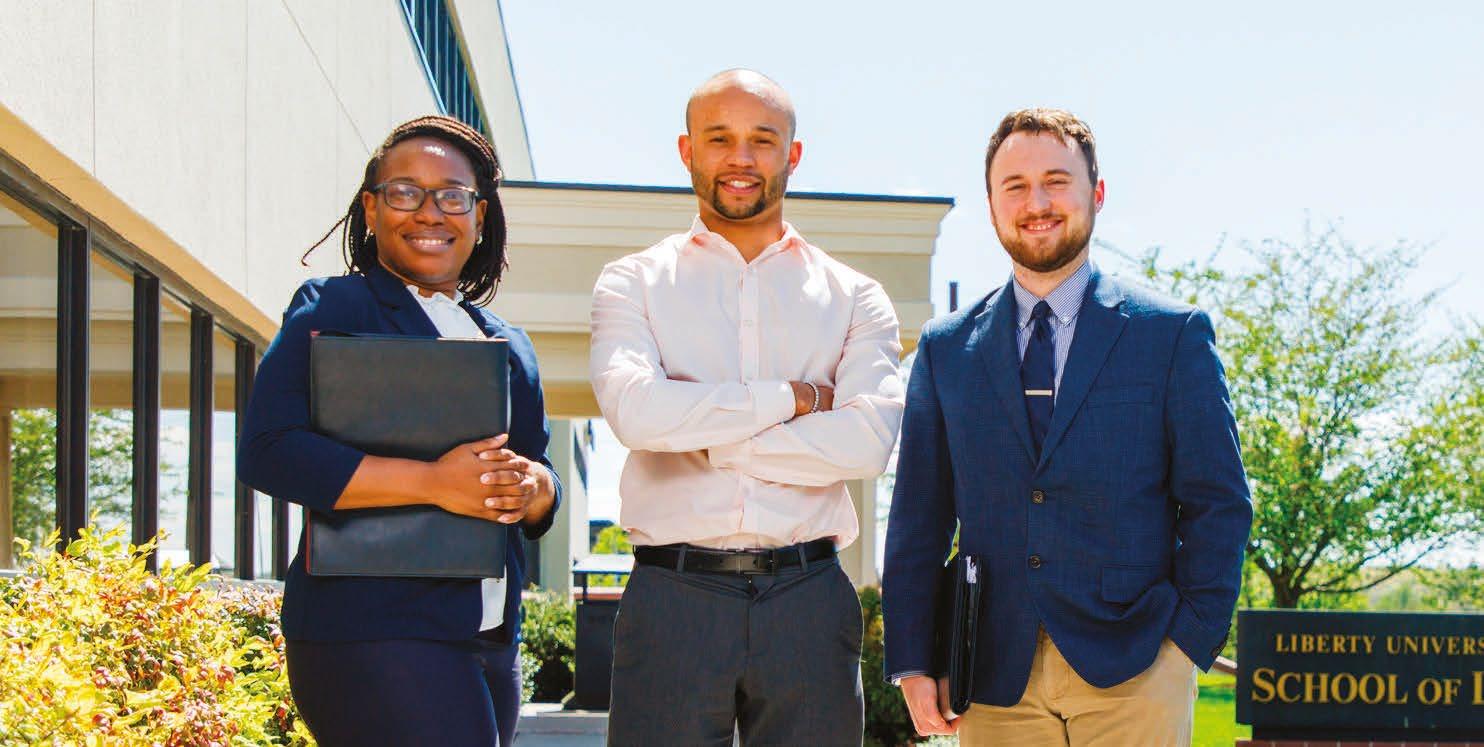
92% (2019) INSPIRE THE PROFESSION. INNOVATE THE PRACTICE. IMPACT THE WORLD. At Liberty University School of Law, we provide unparalleled skills training to produce practice-ready graduates who will become lawyers of distinction. We promote a culture that cultivates both integrity and high ethical standards to ensure our graduates are ready to lead in their communities. Three consecutive years of high bar passage rate for first-time takers: 95% (2018) 92% ( July-Oct. 2020) 92% (2019) � LawCareer@liberty.edu � (434) 592-6068 � Liberty.edu/Law /LibertyUniversityLaw At Liberty University School of Law, we provide unparalleled skills training to produce practice-ready graduates who will become lawyers of distinction. We promote a culture that cultivates both integrity and high ethical standards to ensure our graduates are ready to lead in their communities. Three consecutive years of high bar passage rate for first-time takers: 95% (2018) 92% ( July-Oct. 2020) 92% (2019) IMPACT THE WORLD. � LawCareer@liberty.edu � (434) 592-6068 � Liberty.edu/Law /LibertyUniversityLaw At Liberty University School of Law, we provide unparalleled skills training to produce practice-ready graduates who will become lawyers of distinction. We promote a culture that cultivates both integrity and high ethical standards to ensure our graduates are ready to lead in their communities. Three consecutive years of high bar passage rate for first-time takers: 95% (2018) 92% ( July-Oct. 2020) 92% (2019) IMPACT THE WORLD. � LawCareer@liberty.edu � (434) 592-6068 � Liberty.edu/Law /LibertyUniversityLaw At Liberty University School of Law, we provide unparalleled skills training to produce practice-ready graduates who will become lawyers of distinction. We promote a culture that cultivates both integrity and high ethical standards to ensure our graduates are ready to lead in their communities. Three consecutive years of high bar passage rate for first-time takers: 95% (2018) 92% ( July-Oct. 2020) 92% (2019) INNOVATE THE PRACTICE. IMPACT THE WORLD. � LawCareer@liberty.edu � (434) 592-6068 � Liberty.edu/Law At Liberty University School of Law, we provide unparalleled skills training to produce practice-ready graduates who will become lawyers of distinction. We promote a culture that cultivates both integrity and high ethical standards to ensure our graduates are ready to lead in their communities. Three consecutive years of high bar passage rate for first-time takers: 95% (2018) 92% ( July-Oct. 2020) 92% (2019) INSPIRE THE PROFESSION. INNOVATE THE PRACTICE. IMPACT THE WORLD. At Liberty University School of Law, we provide unparalleled skills training to produce practice-ready graduates who will become lawyers of distinction. We promote a culture that cultivates both integrity and high ethical standards to ensure our graduates are ready to lead in their communities. Three consecutive years of high bar passage rate for first-time takers: 95% (2018) 92% ( July-Oct. 2020)
Take the first step today toward building equity in your brand, promoting your excellence and offering your audience more reasons to trust you. Contact EVG, and a member of EVG’s content licensing team will be happy to answer your questions and get you started.


















































































































































































































































































































You’ve Earned it... EnVeritas Group: creative licensing solutions for brands that earn accolades they deserve. A now Promote it! Enveritas is the exclusive reprints and logo licensing partner for North Carolina Lawyers Weekly Reprinted with permission of North Carolina Lawyers Weekly © 2021 AUGUST 25, 2021 NCLAWYERSWEEKLY.COM ■ BY HEATH HAMACHER A Wake County jury has awarded $3.41 million to a 23-year-old woman for sexual abuse she endured for nearly a decade. Ian Richardson of Vann Attorneys and Daniel Barker of Barker Richardson, both in Raleigh, report that their client, Moriah Taylor, was repeatedly sexually abused by her father, David Taylor, from the time she was 8 years old until she reported the abuse to her bishop when she was 17. Her mother, Toby Taylor, knew about the abuse and did nothing to stop it, Richardson said. Ordinarily, Lawyers Weekly does not divulge the names of victims of sexual abuse. But Richardson said that his client “wanted to shine a bright light on what happened, as she felt like when she was a child this was improperly swept under the rug by numerous people, including her mother.” “I think, at least for our client, there was something powerful about facing this situation head-on,” Richardson said. Court records show that David Taylor was convicted of attempted sexual battery in 2015, and Richardson said that David admitted to sexually abusing Moriah approximately five times, though Moriah claims she was abused “more times than she can count.” The suit alleged negligence and negligent infliction of emotional distress by Toby Taylor. Richardson said that Toby admitted to knowing that when Moriah and some of her sisters (David and Toby have 11 children together, Richardson said) were younger, David would call them into his home office “to inspect their breasts.” “Toby told [Child Protective Services] that she knew something was going on, but couldn’t put her finger on it,” Richardson said. Richardson said that David served just a few days in jail after pleading guilty to the offenses, time meted out only after he violated probation by contacting Moriah. “Therefore, we asked civil jury to hold both he and Toby Taylor accountable for what happened and impose a punishment consistent with the nature of the abuse,” Richardson said. David and Toby represented themselves at trial. After a three-day trial, the jury deliberated about four hours, Richardson said, before finding them liable on Aug. 19 and awarding Moriah $1,185,800 in actual damages and $2,225,000 in punitive damages. Nevertheless, Richardson said he considers it only “halftime” in the case, since David and Toby claim that they are too poor to pay the judgment. “But we have evidence that they own cryptocurrency and substantial precious metals,” Richardson said. “So now we’re going to go focus on collecting.” Follow Heath Hamacher on Twitter @NCLWHamacher Jury awards $3.41M to woman sexually abused by father VERDICT REPORT — SEXUAL ABUSE Amount: $3,410,800 Injuries alleged: Emotional distress and post-traumatic stress disorder Case name: Moriah Taylor v. David and Toby Taylor Court: Wake County Superior Court Case No.: 18-CVS-12294 Judge: Graham Shirley Date of verdict: Aug. 19 Demand: $1 million Highest offer: $25,000 Attorneys for plaintiff: Daniel Barker of Barker Richardson and Ian Richardson of Vann Attorneys, both in Raleigh Attorneys for defendants: None Barker Richardson AMANDA M. CUBIT Sodoma Law Union Monroe O all Amanda M. Cubit’s accomplishments so far in her career, serving on the board of Turning Point, Inc. has been her most important and rewarding. Turning Point, in Union County, serves survivors of domestic violence, sexual assault and child abuse. “The mission of this organization is close to my heart as frequently represent people who have been affected by domestic violence,” she says. Cubit, a family lawyer with Sonoma Law Union in Monroe, received her law degree from Charlotte School of Law in 2012 after graduating from Clemson University with Bachelor of Arts degree in political science. She started her career practicing with Legal Aid of North Carolina. She has happy memories of growing up near Philadelphia, where she enjoyed celebrating birthdays, holidays and important milestones with her parents, two younger siblings and extended family. “Family has always been the most important part of my life, and I would not be who am today without their love and support,” she says. If Cubit could have dinner with anyone of her choosing, it would be her grandfather. She had a close relationship with him, but he passed away when she was young. “There are many questions would love to ask him, and stories would love to hear now that am older,” she says. During the COVID-19 lockdown, Cubit became enthralled with the show “Below Deck” on the Bravo channel. She is still hooked and rarely misses an episode. “My brother is captain of a yacht, and the show gives me a look into how he spends his days,” she says. “It goes without saying that we lead very different lives.” RISING STARS 2021 Reprinted with permission of North Carolina Lawyers Weekly © 2021
enveritasgroup.com







































































































































 Robert El-Jaouhari
Jake Stewart
Robert El-Jaouhari
Jake Stewart










 ■ BY TERI SAYLOR
■ BY TERI SAYLOR














































 By Haviland Stewart
By Haviland Stewart
 By Haviland Stewart hstewart@nclawyersweekly com
By Haviland Stewart hstewart@nclawyersweekly com



















































































































































































